- Home
- Carolyn Keene
Clue in the Ancient Disguise Page 8
Clue in the Ancient Disguise Read online
Page 8
"Phillipe?" Lisa echoed with a puzzled frown. "Are you sure?"
"See for yourself." Nancy handed her the ring.
Lisa studied its engraving under the light, then looked at her friend in perplexity. "I don't understand. Her husband's name was Paul, not Philippe."
Nancy responded with a thoughtful nod. "I know. In fact there's outside evidence to confirm that fact." She told about the old newspaper article discovered by Mr. Teakin of the historical society, which referred to Paul and Yvette Duval by name. "Perhaps your ancestress was married twice," the teenage sleuth suggested.
"I suppose that's possible," Lisa said, her forehead still puckered in a slight frown. "But if so, it's strange that the family was never aware of it ... or if they were, that it was completely forgotten. Still, I guess all memories fade with time, don't they?"
The storm had let up when Nancy left the Thorpes' house soon afterward. She sensed that this was only a temporary lull, and hoped she could reach home before the downpour resumed. Unhappily, she had driven only a few blocks when a fresh gust of rain struck her windshield.
Oh, what luck! she thought wryly. Now I'll probably get drenched before I get indoors again!
She slowed at a blinking-light intersection and peered both ways. The streets seemed deserted at this late hour, and no one was coming from either direction. But as she started across, Nancy glanced in her rearview mirror, then reacted as if she had received an electric shock.
A big, old-fashioned red car was following her — from all appearances, the same car that had chased her the other night!
And, as before, Nancy could make out no driver at the wheel!
A pang of fear shot through the girl! She trod hard on the gas pedal to increase speed, even though she sensed already that her pursuer meant to dog her trail relentlessly!
Sure enough, the red car, too, speeded up. The empty blackness of its front seat was terrifying. But Nancy soon had other problems to claim her attention. The road wound steeply downhill toward the neighborhood where the Drews lived. And steering her car was becoming more and more difficult.
What had happened to her power steering? She could hardly turn the wheel. Nancy hesitated to apply the brakes with her ghostly pursuer so close behind. But she knew she would have to do so soon, unless she could bring her car under control. Otherwise she was in danger of going off the road!
Almost in the same moment that the thought crossed Nancy's mind, the decision was taken out of her hands!
There was a sudden thumpety-bump-bump! as her right wheel hit the curb. Her car slued and bounded from the paved road surface onto the dirt shoulder!
The shock jolted Nancy half out of her seat. She uttered a frozen scream of fright as she glimpsed the steep hillside yawning across her field of vision.
The next instant her car went skidding and crashing down the rough, brush-covered hillside!
14. Legal Threats
Using all of her strength, Nancy wrestled with the steering wheel as it jerked and twisted first in one direction, then in the other. All the while on her wild ride down the hillside, she was trying to stop the car by pushing on the brake pedal. Finally, when she thought she could do no more, she was able to bring the car to a halt, still upright and in one piece.
Considerably shaken and weak, Nancy leaned her head on the steering wheel while the storm raged on.
"Whew!" she said as she pulled herself together, opened the door, and stepped out into the rain.
"I guess the thing to do is to walk back up to the road and down to the next public phone,'' she muttered to herself as she climbed up the hillside, rain streaming over her from head to feet.
Walking as fast as she could against the storm, she reached the shelter of the phone booth and called one of the 24-hour towing service numbers provided by the company that insured her car. Nancy explained her predicament and asked if she could be dropped off at her house while the car was being towed to Bill's Garage, where the Drews were old customers.
"Sure, no problem," the service man said cheerfully, "if you don't mind riding up in the cab with me."
Twenty minutes later, Nancy walked into her house, drenched to the skin. The rest of the household was asleep, and Nancy, after disposing of her wet clothes, dried her hair and left a note for her father explaining what had happened to her car. Then she fell into bed exhausted.
She was so tired that she slept later than usual the next morning. By the time she showered and dressed, it was after 9:30 A.M.
Going downstairs, she found a place set for her at the kitchen table and a note from Hannah saying she had gone to the supermarket. Carson Drew had long since left for the office, so Nancy sat down to a lonely breakfast.
On the way to the refrigerator for milk and orange juice, Nancy switched on a small TV set that Hannah kept on the kitchen counter.
"May as well listen to the news," she said as she settled down at the table and spooned some strawberries onto her cereal.
"And now for some local news items," the announcer's voice boomed out. "Here in River Heights, artists and other participants in the local art scene were shocked by the revelation that the prize-winning painting in a recent art contest was a copy of a picture owned by the River Heights Museum. The discovery that artist Lee Talbot had copied his subject matter from the work of another painter was made by the famous teenage detective, Nancy Drew. Talbot could not be reached for . . ."
Nancy, very upset, switched off the TV set and went into the living room to look at the copy of the Morning Record, which had been brought in earlier from the porch by Carson Drew. Hastily checking through the paper, Nancy found the story of the copied painting on page 3. But this report made no mention of her part in the affair.
Puzzled, Nancy went into the hall to the telephone and quickly dialed the newspaper office. She asked to speak to reporter Peter Worden.
"Hello, Nancy," he said when she reached him. "You read my story in the Morning Record, right?"
"Yes, I did, Peter. Thank you for not mention-
ing my name.
"I always try to grant the request of beautiful girls," the reporter answered flirtatiously.
Nancy laughed. "Even though you didn't publish it, did you mention my name to anyone in connection with the story?"
"Absolutely not," he said in a more serious voice. "Why do you ask?"
"I was just listening to the morning news on television," Nancy replied. "The broadcast named me as the one who discovered that Lee Talbot's painting was a copy."
"Well, I'll be!" Peter Worden exclaimed. "Nancy, I don't know what to say. I swear I didn't violate your confidence. I told nobody." He declared this so earnestly and sounded so distressed that Nancy could not help but believe him.
"It's certainly a puzzle," she said in a troubled voice, "and it leaves me in a very unpleasant position. Still, there's no use fretting over it—what's done is done. I suppose sooner or later we'll find out how my name was brought into it."
"I'll check around and see what I can find out, Nancy," Worden said unhappily. "Meanwhile, if I can help in any way, please call on me."
Thanking him, Nancy returned to her unfinished breakfast in the kitchen. But the sight of the soggy cereal in the bowl drove away what little appetite she had left. Just then, the telephone rang and Nancy went to answer it.
"Miss Nancy Drew, please. Emily Owsler calling."
"This is Nancy speaking, Miss Owsler. How are you?"
"Oh—I'm just fine, dear." The maid paused as if to choose her next words, then went on. "I've just thought of something of Miss Duval's that might help you, something I was given as a keepsake. Perhaps you would like to look at it?"
Nancy's mood brightened. "Yes, indeed, Miss Owsler. Er, what is it?"
"An old photograph album. I thought by looking at the pictures in it, you might come across a clue of some sort," the elderly woman said hopefully.
"Why, that's an excellent idea! Thanks ever so much for letting me know."
>
Nancy arranged to visit Miss Owsler. She had no sooner hung up and turned away than the telephone shrilled again.
"I'd like to speak to Nancy Drew," snarled an angry voice.
"I'm Nancy Drew. Who is this?"
"This, Miss Drew, is Lee Talbot. You have publicly and falsely accused me of stealing, of plagiarism. I am therefore suing you for libel and defamation of character. You'll hear from my lawyer!" he threatened.
A look of dismay flickered over Nancy's face during this stormy speech. But she replied calmly enough, "Then please have your attorney contact my father, Carson Drew. He will act as my counsel."
Lee Talbot's response was to slam down the receiver, breaking the connection.
As Nancy turned from the phone, Hannah Gruen, the Drews' housekeeper, bustled in the door with two bags of groceries.
On seeing Nancy's expression, Hannah asked, "Has anything happened, dear? You look very upset and unhappy." She gave the girl a quick hug after setting down her load from the supermarket.
"Oh, Hannah, I've had a rather unpleasant morning. Could you take time out and drive me to Bill's Garage so I can pick up my car? I'll tell you all my troubles on the way."
They reached the garage in the Drews' station wagon just as Nancy finished relating the morning's events, ending with a description of Lee Talbot's threatening telephone call.
"My goodness, no wonder you looked so upset, dear!" a worried Hannah exclaimed as
Nancy got out of the car. "But don't let it get you down. I'm sure your father will know how to deal with that fellow. In the meantime, take care of yourself."
'Til try, Hannah. Good-bye and thanks for the lift. ,,
Rick, the garage mechanic, was just closing the hood of Nancy's car. "All set, Miss Drew," he smiled, then added more soberly, "I think you ought to be more careful where you park your car, hereafter. ,,
"Oh? Why?"
"Some joker cut the power steering hose. All the fluid leaked out."
"So that's why I had so much trouble turning the wheel!" Nancy frowned reflectively. "At first I didn't notice anything wrong. But I suppose the fluid leaked out gradually as I drove along."
"Right. Also, another odd thing, we had a call this morning. Fellow wanting to know if we had picked up Nancy Drew's car."
As Nancy's eyes widened, Rick said. "Maybe you ought to report it to the police."
"You're right, I will," the girl sleuth promised. She paid the repair bill and drove off.
Nancy decided to check with the curator at the art museum to try to find out how her name got into the news report about Lee Talbot's painting. But when she saw him in his office later that morning, he was unable to shed any light on the matter.
"No one talked to me about Lee Talbot or his painting, Nancy," Mr. Gregory said regretfully. "I'm sorry I can't help."
Seeing her disappointed look, however, he went on, hoping to cheer her up.
"But we have located that missing picture you were asking about—the one donated by the Duval family when the museum first opened!"
15. An Old Likeness
Mr. Gregory opened the door to a closet in his office and brought out a painting with an old, ornate gilt frame. Nancy stared at the portrait.
The painter had depicted a handsome young man with dark eyes and a cleft chin. He was dressed in the elegant style of the late eighteenth century. He had a tall, white powdered wig and a pale blue velvet coat embroidered in gold with a frothy jabot gathered at the throat of his fine white shirt.
"A striking fellow, I must admit," Mr. Gregory remarked, "even if the painting's not all that valuable."
"Yes," Nancy agreed and went on musingly, "It's strange, but he reminds me of someone." Try as she would, Nancy could not place the resemblance. "Can you tell me anything about the painting, Mr. Gregory, besides the fact that it was donated by the Duval family?"
The curator pointed to some small, scriptlike markings in the lower right-hand corner of the canvas. "Well, I have deciphered the artist's signature. He was Antoine Grivet, a minor French painter who flourished in the late 1700s. The date is less easy to make out, but appears to be 1790."
"Is there any way to find out whose portrait this was?" Nancy asked.
"Hm, yes, it may be possible to establish the subject of the picture. One would have to consult an expert who specializes in French art of that period. There's a chap in New York who might be able to help. I'll call him this afternoon."
Mr. Gregory replaced the painting in the closet and locked the door, then glanced at his watch. "Oh, my goodness. I have a meeting with the trustees in five minutes. Nancy, could you excuse me?"
"Of course. And thanks ever so much for letting me know about the Duval painting."
"A pleasure, my dear. It's the least I could do after your efforts to help solve those break-ins."
They parted outside the curator's office. Mr. Gregory bustled off down the corridor. As
Nancy walked toward the marble staircase which led down into the lobby, she happened to glance in an open doorway. A dark-haired young woman in a blue smock was bent over a framed painting on a worktable in front of her, carefully examining and cleaning the painted canvas. The young woman looked up and their eyes met.
"Hi, Nancy!" She was the curator's assistant, Jane Heron. "On the trail of another mystery? ,,
"Well, a small one." Nancy paused for a moment to chat. "But so far I'm not having much luck."
"What's the mystery, may I ask?"
"How that television news report this morning came to name me as the one who discovered that Lee Talbot's prize-winning painting looked like a picture in the museum."
"But you are the one, aren't you?"
Nancy smiled ruefully. "Yes and no. Actually it was a reporter for the Record, Peter Worden, who first noticed the similarity. I just happened to spot the picture he had in mind. It was the one I photographed down in the basement storage area, remember?"
Miss Heron nodded, looking troubled. "Yes, indeed I do."
"But, you see, I knew the discovery was likely to stir up a good deal of unpleasantness, and I didn't want to become involved. So I asked Mr. Worden not to mention my name when he wrote his news story. He promised he wouldn't, and he assures me he kept his promise. Yet the television newscaster this morning named me as the person who made the discov-ery.
"Oh, dear!" A look of distress had come over Jane Heron's face. "Nancy, I'm very much afraid that I'm the one who's to blame!"
"You?" Nancy stared at the museum staffer in surprise. "I don't understand. How did it happen?"
Miss Heron explained unhappily that a television camera crew had come to the museum to photograph the picture in question, after picking up Worden's story over the news wire, even before it appeared in the morning Record.
"They wanted to interview me," she went on, "but at the time I knew nothing about the matter, so all I could tell them was that I had seen you photographing the picture. They must have assumed from that that you were the one who'd discovered the similarity of the two paintings."
The girl detective responded with a thoughtful nod. "Yes, that probably explains it."
"Oh, Nancy, I'm terribly sorry!" Jane Heron exclaimed, reaching out to squeeze her hand. "I just wasn't using my head. I should have spoken to you before mentioning your name. Can you possibly forgive me for not being more cautious?"
Seeing that the woman was upset, Nancy summoned a smile. "Don't worry, you had no way of knowing. In your place, I might have done the same. At least you've solved one mystery for me."
After leaving the museum, Nancy decided to visit Pierre Michaud, to see how he was coming along repairing his invention, and also to tell him about the latest developments in his case.
When she arrived at his workshop, she found him busily at work with his tools and electronic equipment. "You see, Nancy, a representative of the National Computer Company called and said they were interested in seeing my memory device. So I must have everything ready to demonstr
ate my invention when he comes here. He may be in River Heights within the next day or two."
"Golly, can you be ready that soon?"
"Om, if that is when he is coming, then I must be ready, even if it means working day and night," Pierre replied with a smile. "Anything is possible if one works hard enough! Is that not what you say here in America?"
Watching his mobile features while he talked, Nancy was struck by a sudden realization. Now she knew whom the man in the portrait reminded her of! No doubt the wig had thrown her off.
"Is something wrong?" Pierre inquired, seeing her startled expression.
Nancy's blue eyes twinkled. "Far from it. In fact you just made something come right for me." She described the picture which the museum curator had shown her and asked if by any chance it might be a painting of someone in his family.
"Mais non, Nancy. It could not be a Michaud. My family was of humble origin. No velvet or gold-embroidered clothes for us!" He laughed and added with a wave of his hand toward the computer assembly. "There may be before long, though, if I can get this finished and sell it!"
Nancy was about to leave a short time later when an expensive-looking car pulled up outside the building and Pierre's backer, Mr. Var-ney, came striding into the workshop. The big, vigorous-looking financier seemed preoccupied and disturbed.
"My boy," he blurted, "I don't like the way things are shaping up, not one bit."
"Do you mean the explosion, sir?" Pierre asked anxiously.
"Not only the blast itself, but the news report that was broadcast about what happened. Do you realize this could ruin your chances of selling your invention? Nobody wants to invest in something so risky it may blow up in his face!"
"But, Mr. Varney, you were here just after it happened. You know the explosion was not my fault. Miss Drew will tell you that the computer I was using to demonstrate my device had been bobby-trapped. Some enemy wired it with a bomb that was set to go off when the computer was turned on!"
"Yes, yes, we know all that. But that is certainly not the impression that listeners to the news broadcast will get. fm sorry, but I may have to reconsider giving you any further financial support!"

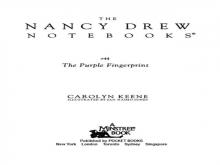 The Purple Fingerprint
The Purple Fingerprint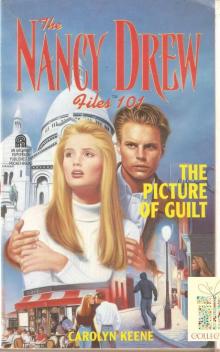 The Picture of Guilt
The Picture of Guilt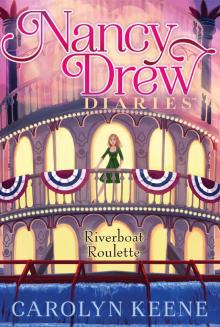 Riverboat Roulette
Riverboat Roulette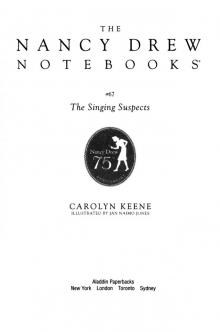 The Singing Suspects
The Singing Suspects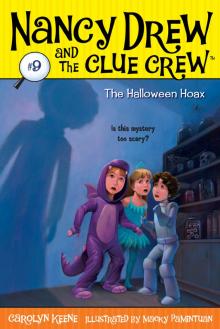 The Halloween Hoax
The Halloween Hoax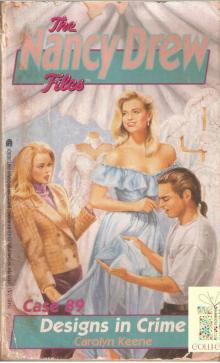 089 Designs in Crime
089 Designs in Crime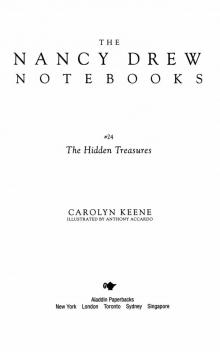 The Hidden Treasures
The Hidden Treasures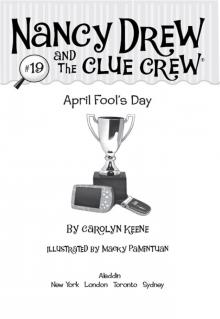 April Fool's Day
April Fool's Day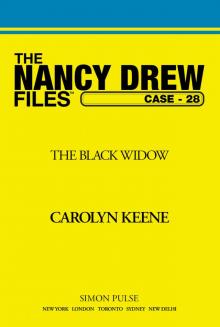 The Black Widow
The Black Widow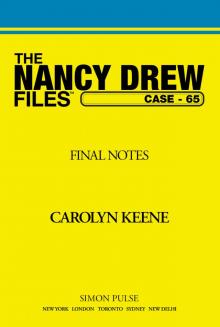 Final Notes
Final Notes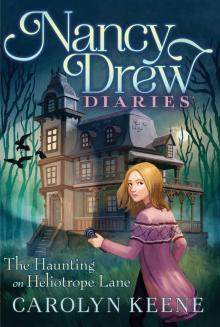 The Haunting on Heliotrope Lane
The Haunting on Heliotrope Lane The Runaway Bride
The Runaway Bride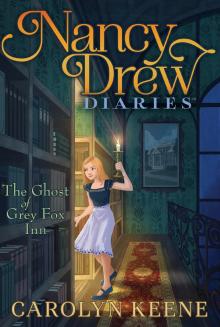 The Ghost of Grey Fox Inn
The Ghost of Grey Fox Inn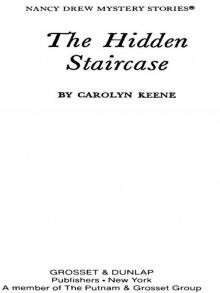 The Hidden Staircase
The Hidden Staircase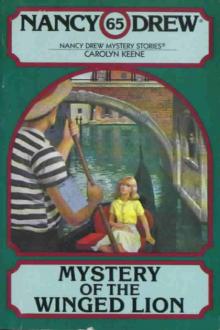 Mystery of the Winged Lion
Mystery of the Winged Lion Over the Edge
Over the Edge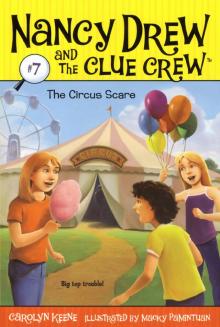 The Circus Scare
The Circus Scare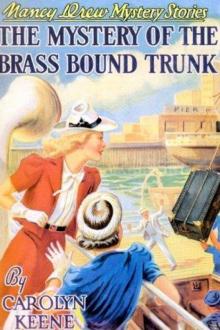 The Mystery of the Brass-Bound Trunk
The Mystery of the Brass-Bound Trunk Ski School Sneak
Ski School Sneak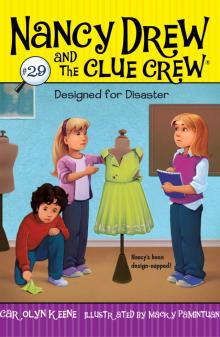 Designed for Disaster
Designed for Disaster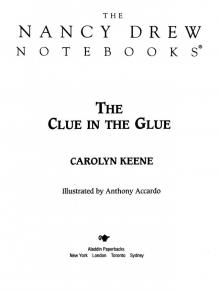 The Clue in the Glue
The Clue in the Glue Cold as Ice
Cold as Ice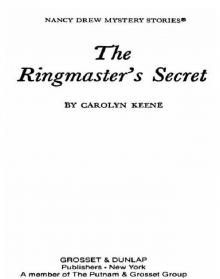 The Ringmaster's Secret
The Ringmaster's Secret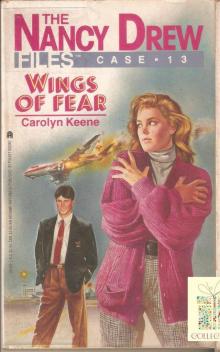 013 Wings of Fear
013 Wings of Fear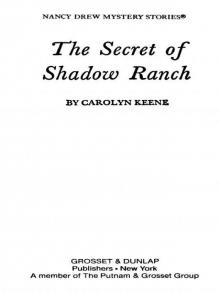 The Secret of Shadow Ranch
The Secret of Shadow Ranch Not Nice on Ice
Not Nice on Ice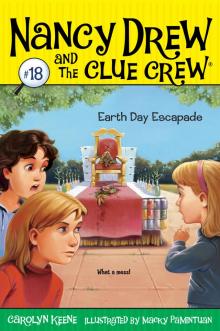 Earth Day Escapade
Earth Day Escapade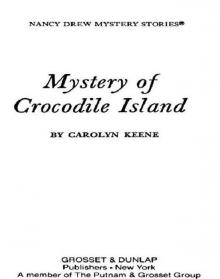 Mystery of Crocodile Island
Mystery of Crocodile Island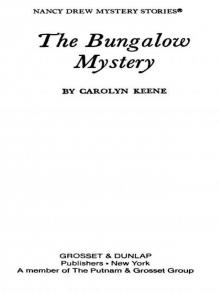 The Bungalow Mystery
The Bungalow Mystery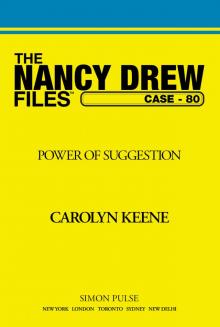 Power of Suggestion
Power of Suggestion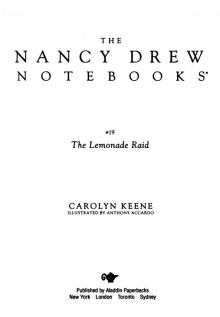 The Lemonade Raid
The Lemonade Raid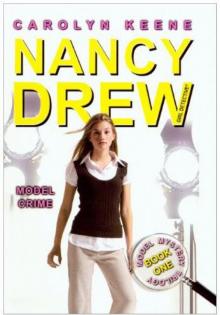 Model Crime
Model Crime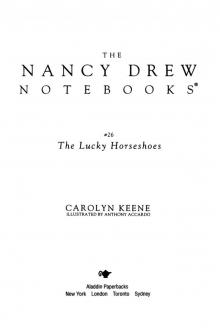 The Lucky Horseshoes
The Lucky Horseshoes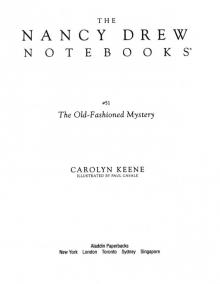 The Secret of the Old Clock
The Secret of the Old Clock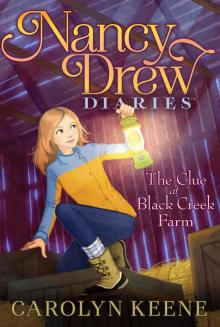 The Clue at Black Creek Farm
The Clue at Black Creek Farm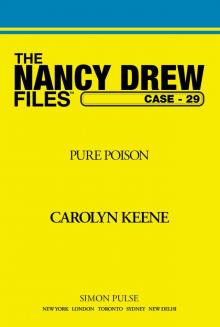 Pure Poison
Pure Poison Nobody's Business
Nobody's Business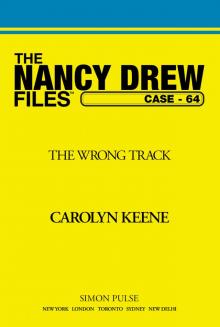 Wrong Track
Wrong Track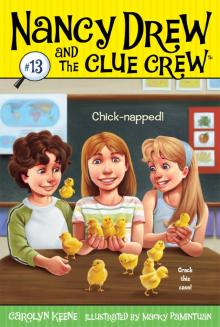 Chick-Napped!
Chick-Napped!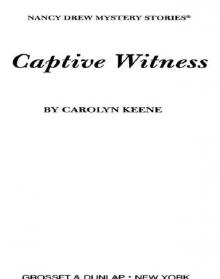 Captive Witness
Captive Witness If Looks Could Kill
If Looks Could Kill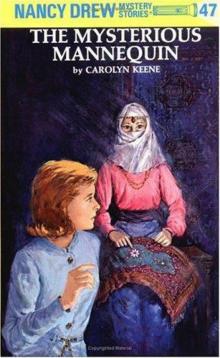 The Mysterious Mannequin
The Mysterious Mannequin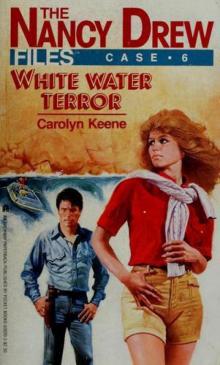 White Water Terror
White Water Terror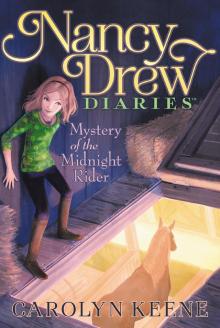 Mystery of the Midnight Rider
Mystery of the Midnight Rider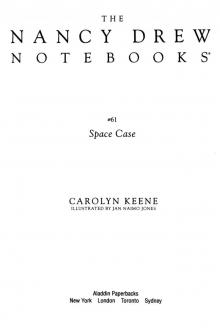 Space Case
Space Case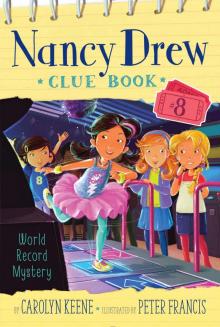 World Record Mystery
World Record Mystery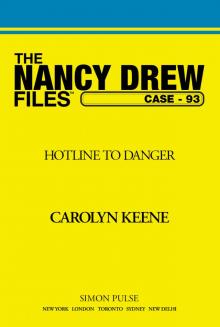 Hotline to Danger
Hotline to Danger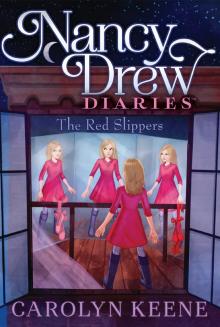 The Red Slippers
The Red Slippers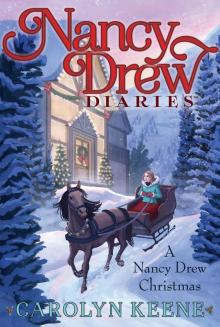 A Crime for Christmas
A Crime for Christmas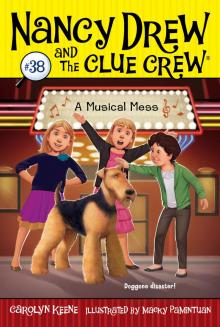 A Musical Mess
A Musical Mess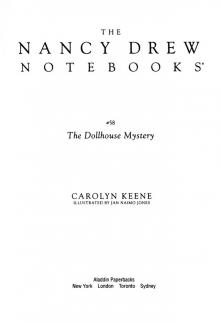 The Dollhouse Mystery
The Dollhouse Mystery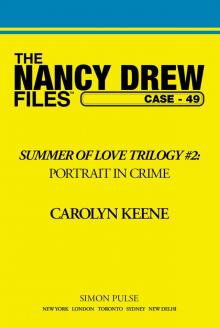 Portrait in Crime
Portrait in Crime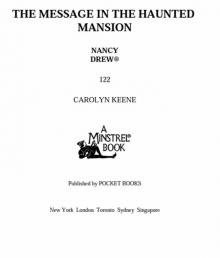 The Message in the Haunted Mansion
The Message in the Haunted Mansion Playing With Fire
Playing With Fire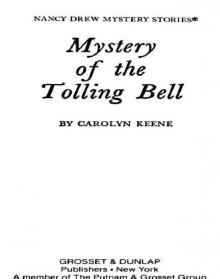 Mystery of the Tolling Bell
Mystery of the Tolling Bell Cutting Edge
Cutting Edge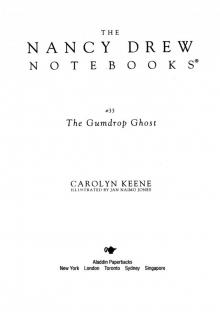 The Gumdrop Ghost
The Gumdrop Ghost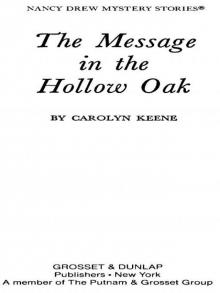 The Message in the Hollow Oak
The Message in the Hollow Oak Trial by Fire
Trial by Fire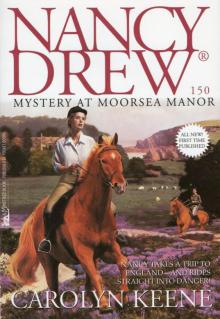 Mystery at Moorsea Manor
Mystery at Moorsea Manor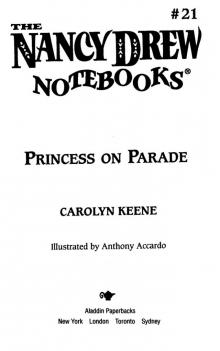 Princess on Parade
Princess on Parade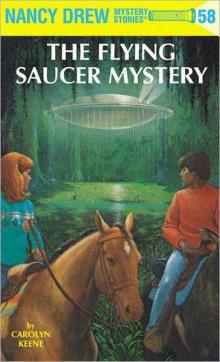 The Flying Saucer Mystery
The Flying Saucer Mystery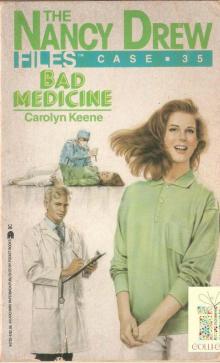 035 Bad Medicine
035 Bad Medicine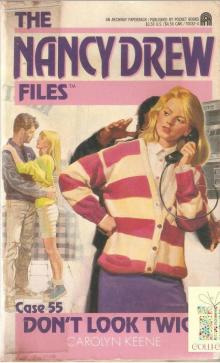 055 Don't Look Twice
055 Don't Look Twice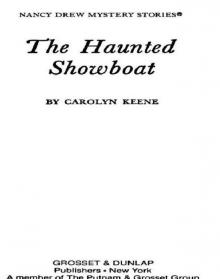 The Haunted Showboat
The Haunted Showboat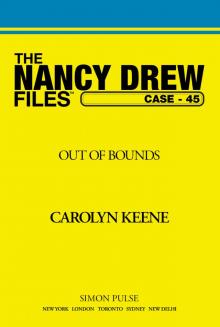 Out of Bounds
Out of Bounds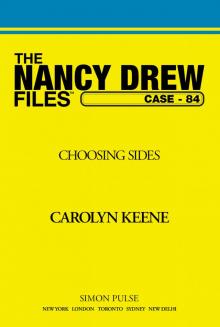 Choosing Sides
Choosing Sides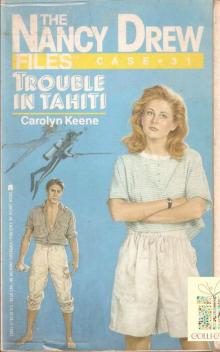 031 Trouble in Tahiti
031 Trouble in Tahiti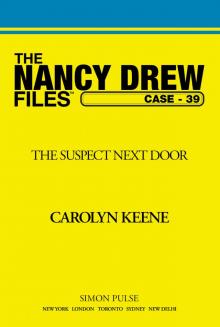 The Suspect Next Door
The Suspect Next Door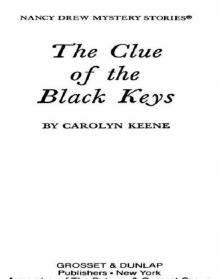 The Clue of the Black Keys
The Clue of the Black Keys The Secret Santa
The Secret Santa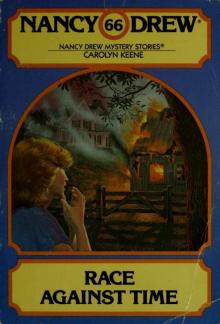 Race Against Time
Race Against Time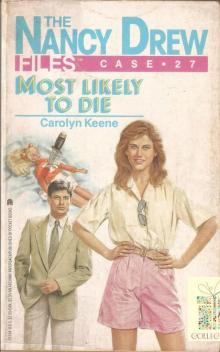 027 Most Likely to Die
027 Most Likely to Die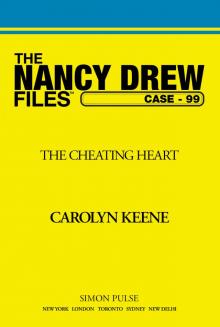 The Cheating Heart
The Cheating Heart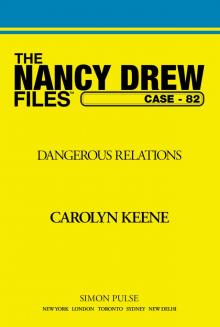 Dangerous Relations
Dangerous Relations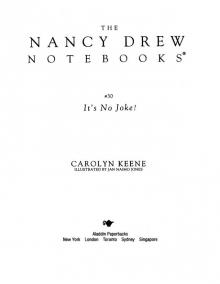 It's No Joke!
It's No Joke!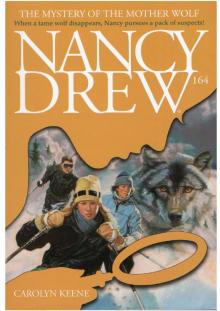 The Mystery of the Mother Wolf
The Mystery of the Mother Wolf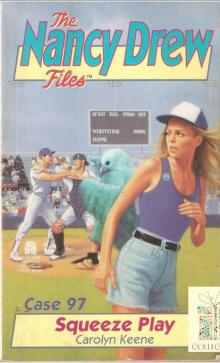 097 Squeeze Play
097 Squeeze Play Secret at Mystic Lake
Secret at Mystic Lake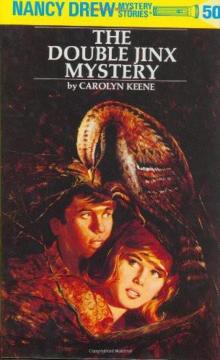 The Double Jinx Mystery
The Double Jinx Mystery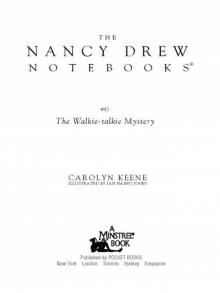 The Walkie Talkie Mystery
The Walkie Talkie Mystery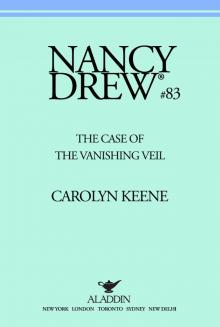 The Case of the Vanishing Veil
The Case of the Vanishing Veil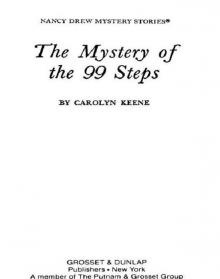 The Mystery of the 99 Steps
The Mystery of the 99 Steps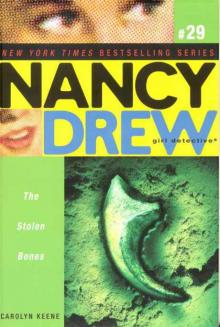 The Stolen Bones
The Stolen Bones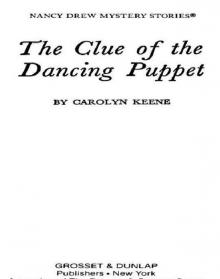 The Clue of the Dancing Puppet
The Clue of the Dancing Puppet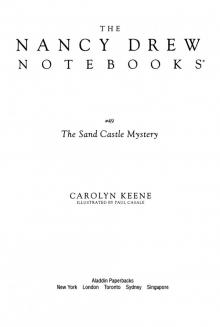 The Sand Castle Mystery
The Sand Castle Mystery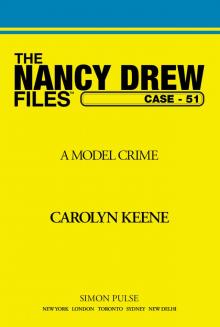 A Model Crime
A Model Crime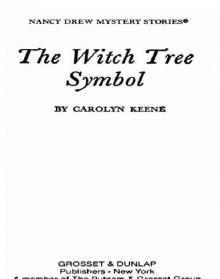 The Witch Tree Symbol
The Witch Tree Symbol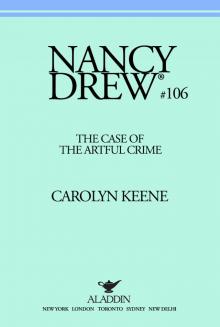 The Case of the Artful Crime
The Case of the Artful Crime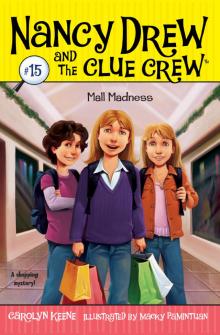 Mall Madness
Mall Madness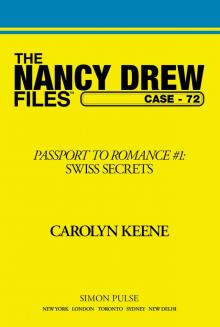 Swiss Secrets
Swiss Secrets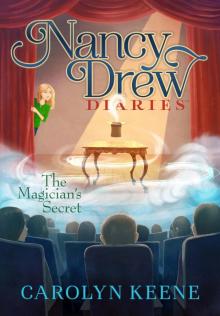 The Magician's Secret
The Magician's Secret Tall, Dark and Deadly
Tall, Dark and Deadly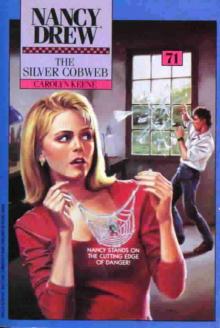 The Silver Cobweb
The Silver Cobweb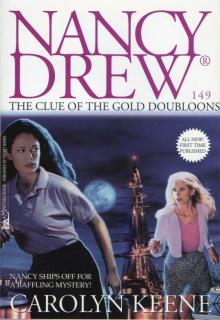 The Clue of the Gold Doubloons
The Clue of the Gold Doubloons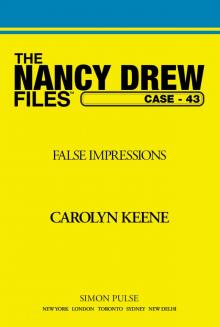 False Impressions
False Impressions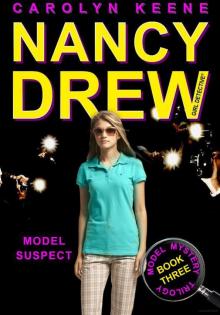 Model Suspect
Model Suspect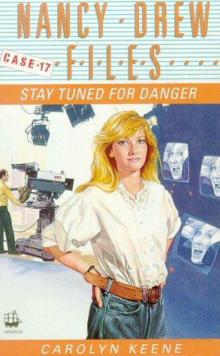 Stay Tuned for Danger
Stay Tuned for Danger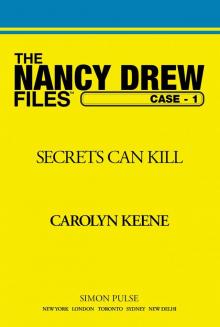 Secrets Can Kill
Secrets Can Kill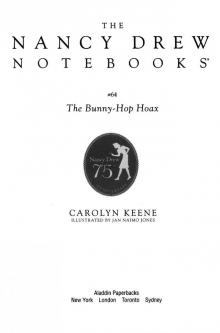 The Bunny-Hop Hoax
The Bunny-Hop Hoax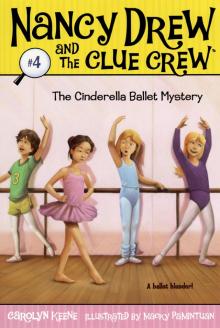 The Cinderella Ballet Mystery
The Cinderella Ballet Mystery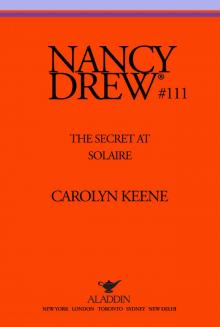 The Secret at Solaire
The Secret at Solaire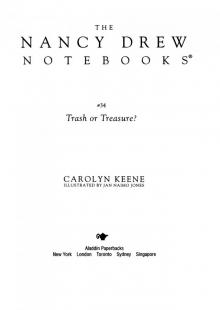 Trash or Treasure?
Trash or Treasure?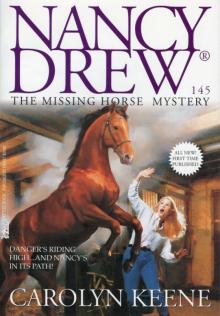 The Missing Horse Mystery
The Missing Horse Mystery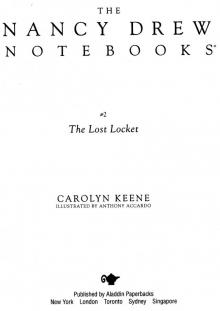 The Lost Locket
The Lost Locket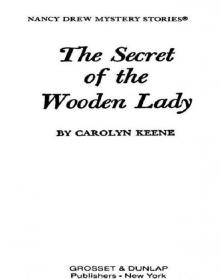 The Secret of the Wooden Lady
The Secret of the Wooden Lady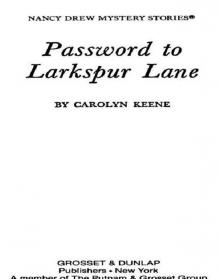 Password to Larkspur Lane
Password to Larkspur Lane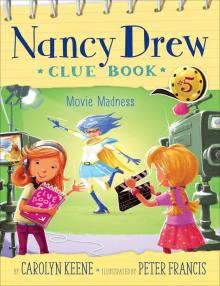 Movie Madness
Movie Madness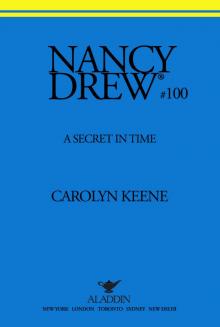 A Secret in Time
A Secret in Time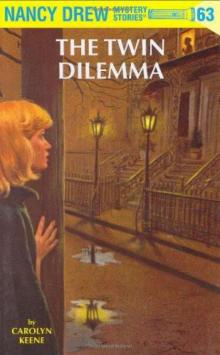 The Twin Dilemma
The Twin Dilemma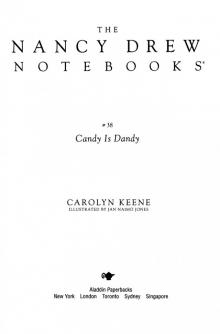 Candy Is Dandy
Candy Is Dandy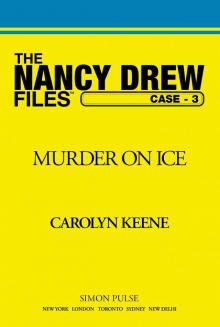 Murder on Ice
Murder on Ice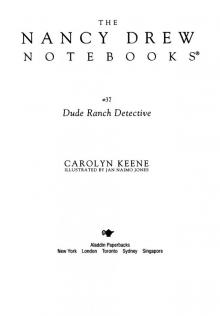 Dude Ranch Detective
Dude Ranch Detective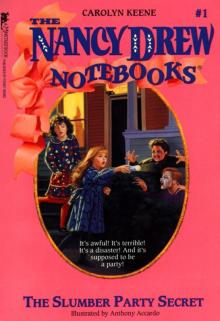 The Slumber Party Secret
The Slumber Party Secret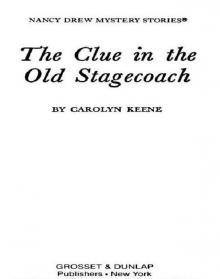 The Clue in the Old Stagecoach
The Clue in the Old Stagecoach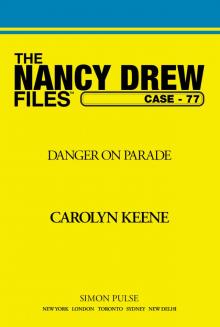 Danger on Parade
Danger on Parade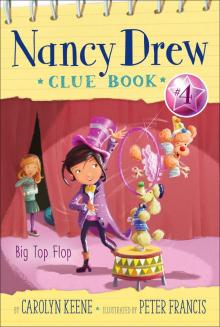 Big Top Flop
Big Top Flop Strangers on a Train
Strangers on a Train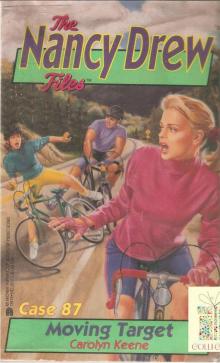 087 Moving Target
087 Moving Target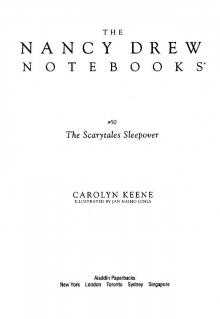 The Scarytales Sleepover
The Scarytales Sleepover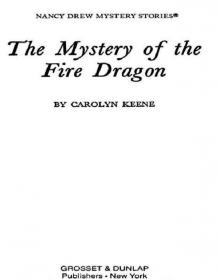 The Mystery of the Fire Dragon
The Mystery of the Fire Dragon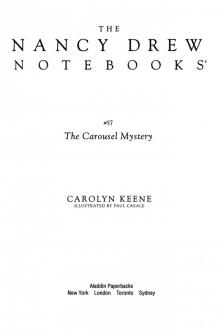 The Carousel Mystery
The Carousel Mystery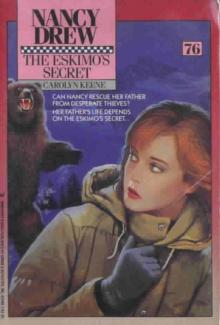 The Eskimo's Secret
The Eskimo's Secret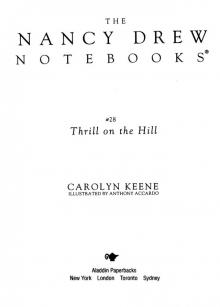 Thrill on the Hill
Thrill on the Hill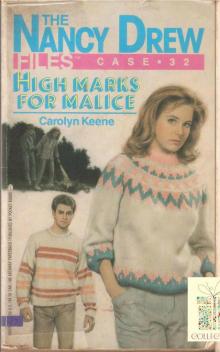 032 High Marks for Malice
032 High Marks for Malice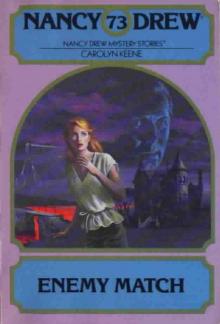 Enemy Match
Enemy Match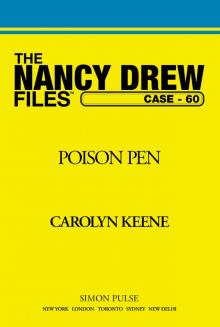 Poison Pen
Poison Pen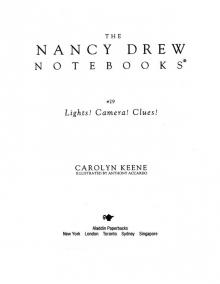 Lights, Camera . . . Cats!
Lights, Camera . . . Cats!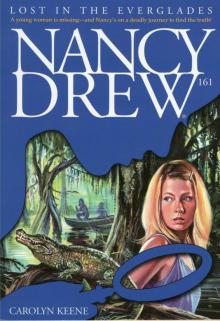 Lost in the Everglades
Lost in the Everglades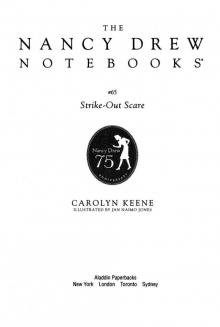 Strike-Out Scare
Strike-Out Scare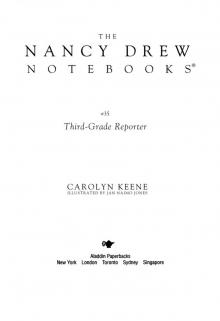 Third-Grade Reporter
Third-Grade Reporter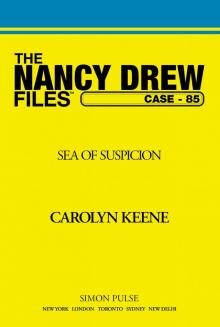 Sea of Suspicion
Sea of Suspicion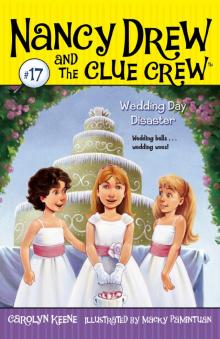 Wedding Day Disaster
Wedding Day Disaster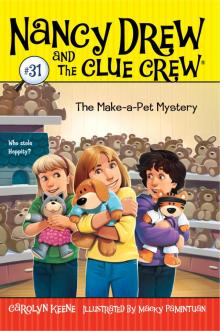 The Make-A-Pet Mystery
The Make-A-Pet Mystery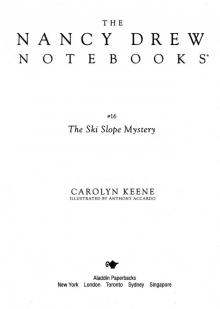 The Ski Slope Mystery
The Ski Slope Mystery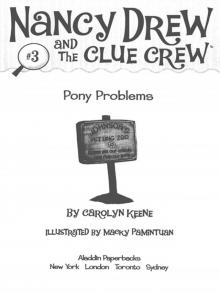 Pony Problems
Pony Problems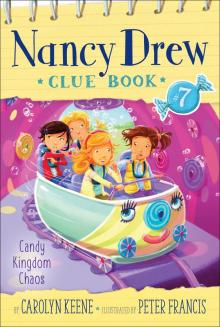 Candy Kingdom Chaos
Candy Kingdom Chaos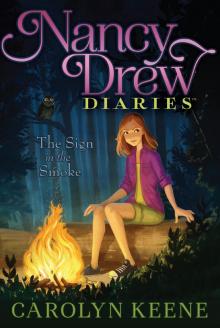 The Sign in the Smoke
The Sign in the Smoke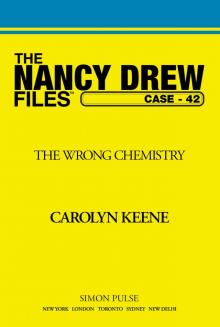 The Wrong Chemistry
The Wrong Chemistry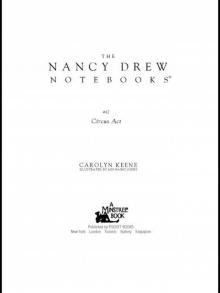 Circus Act
Circus Act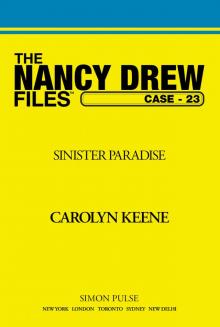 Sinister Paradise
Sinister Paradise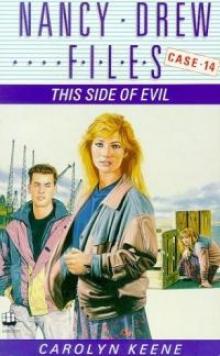 This Side of Evil
This Side of Evil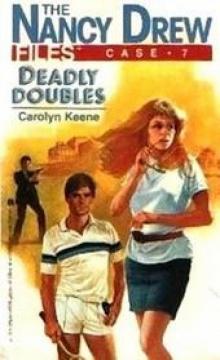 Deadly Doubles
Deadly Doubles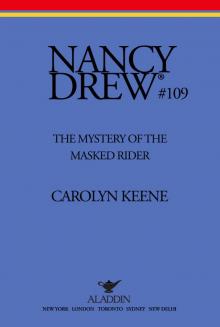 The Mystery of the Masked Rider
The Mystery of the Masked Rider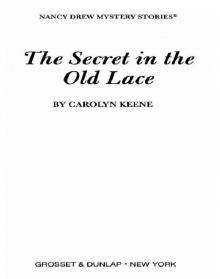 The Secret in the Old Lace
The Secret in the Old Lace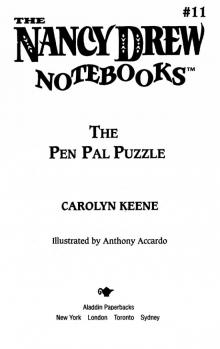 The Pen Pal Puzzle
The Pen Pal Puzzle Without a Trace
Without a Trace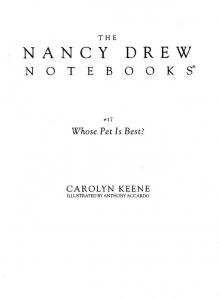 Whose Pet Is Best?
Whose Pet Is Best?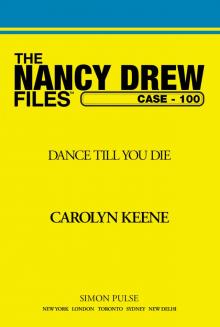 Dance Till You Die
Dance Till You Die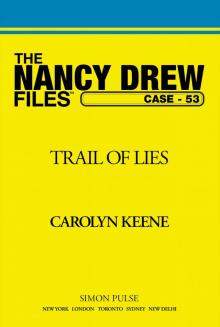 Trail of Lies
Trail of Lies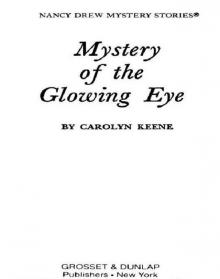 Mystery of the Glowing Eye
Mystery of the Glowing Eye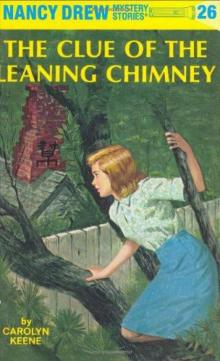 The Clue of the Leaning Chimney
The Clue of the Leaning Chimney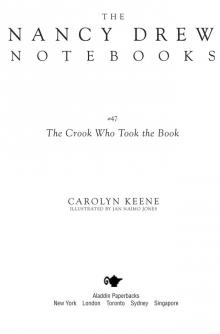 The Crook Who Took the Book
The Crook Who Took the Book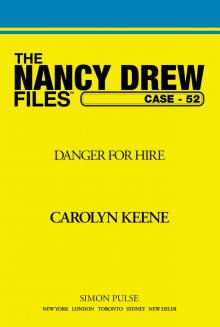 Danger for Hire
Danger for Hire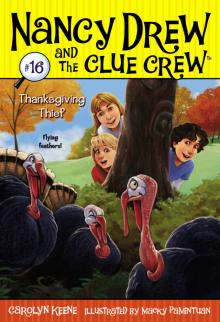 Thanksgiving Thief
Thanksgiving Thief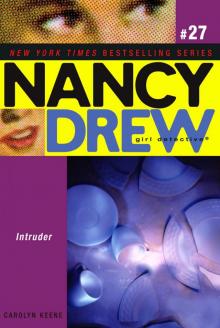 Intruder!
Intruder!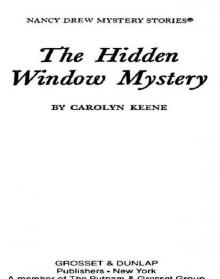 The Hidden Window Mystery
The Hidden Window Mystery Win, Place or Die
Win, Place or Die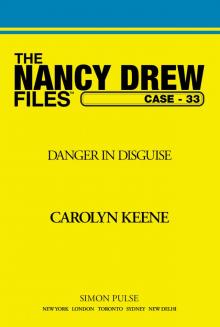 Danger in Disguise
Danger in Disguise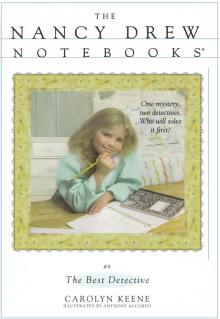 The Best Detective
The Best Detective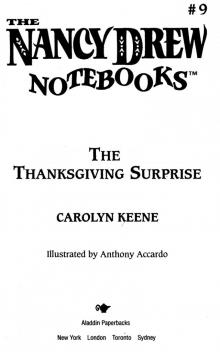 The Thanksgiving Surprise
The Thanksgiving Surprise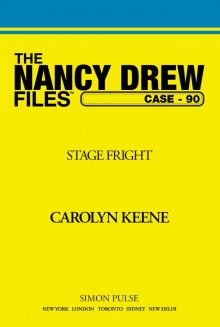 Stage Fright
Stage Fright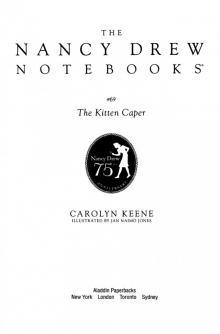 The Kitten Caper
The Kitten Caper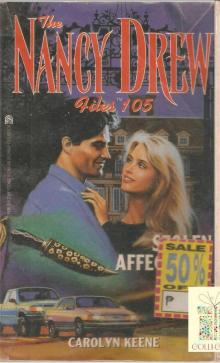 Stolen Affections
Stolen Affections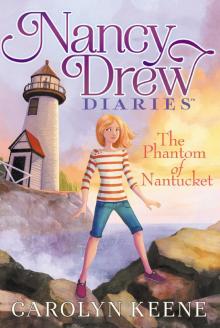 The Phantom of Nantucket
The Phantom of Nantucket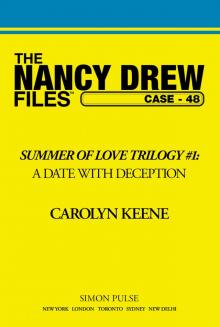 Date With Deception
Date With Deception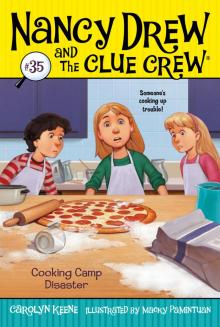 Cooking Camp Disaster
Cooking Camp Disaster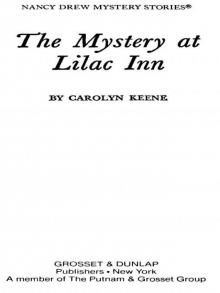 The Mystery at Lilac Inn
The Mystery at Lilac Inn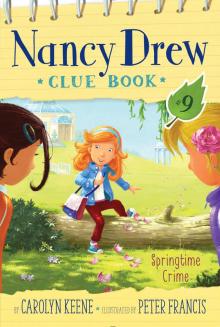 Springtime Crime
Springtime Crime Action!
Action! Into Thin Air
Into Thin Air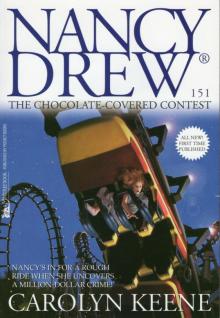 The Chocolate-Covered Contest
The Chocolate-Covered Contest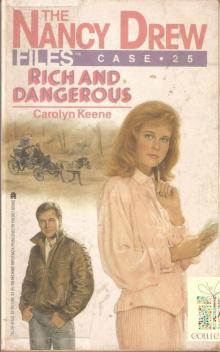 025 Rich and Dangerous
025 Rich and Dangerous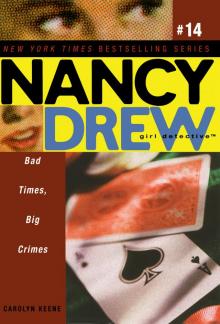 Bad Times, Big Crimes
Bad Times, Big Crimes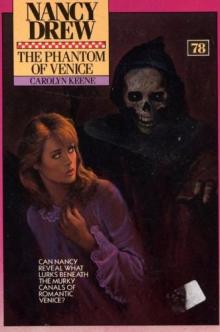 078 The Phantom Of Venice
078 The Phantom Of Venice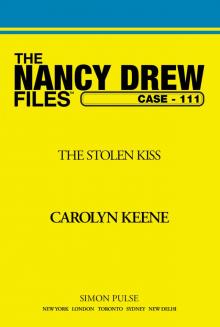 The Stolen Kiss
The Stolen Kiss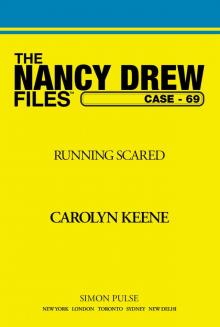 Running Scared
Running Scared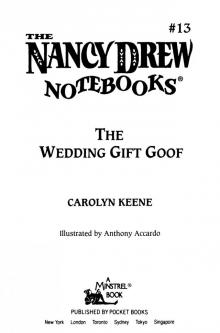 The Wedding Gift Goof
The Wedding Gift Goof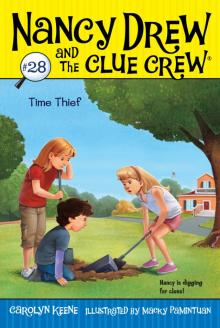 Time Thief
Time Thief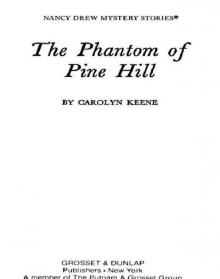 The Phantom of Pine Hill
The Phantom of Pine Hill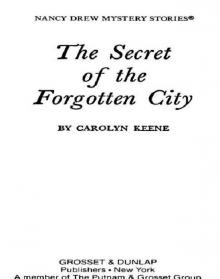 The Secret of the Forgotten City
The Secret of the Forgotten City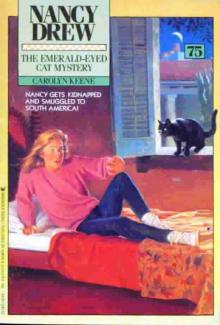 The Emerald-Eyed Cat Mystery
The Emerald-Eyed Cat Mystery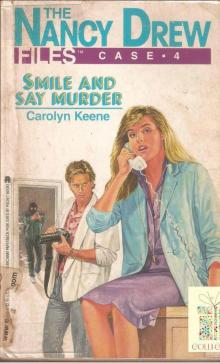 004 Smile and Say Murder
004 Smile and Say Murder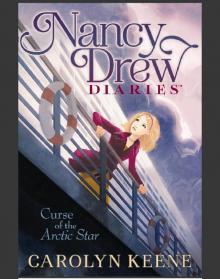 Curse of the Arctic Star
Curse of the Arctic Star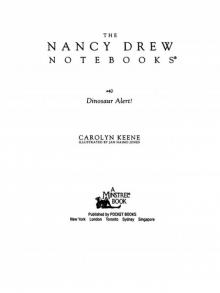 Dinosaur Alert!
Dinosaur Alert!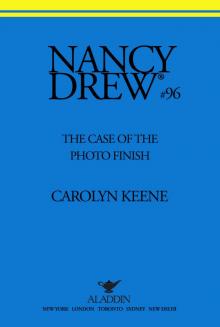 The Case of the Photo Finish
The Case of the Photo Finish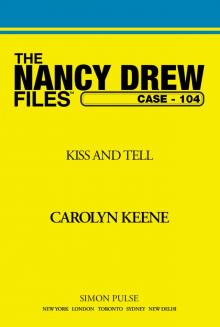 Kiss and Tell
Kiss and Tell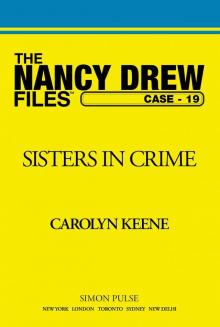 Sisters in Crime
Sisters in Crime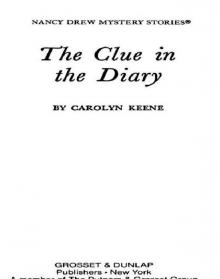 The Clue in the Diary
The Clue in the Diary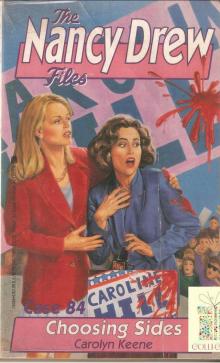 084 Choosing Sides
084 Choosing Sides Haunting of Horse Island
Haunting of Horse Island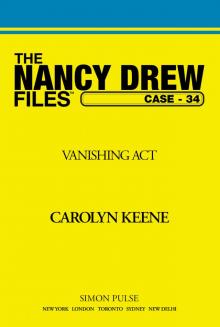 Vanishing Act
Vanishing Act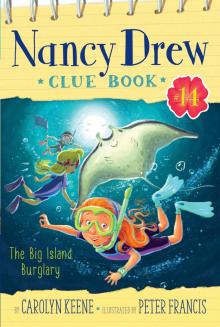 The Big Island Burglary
The Big Island Burglary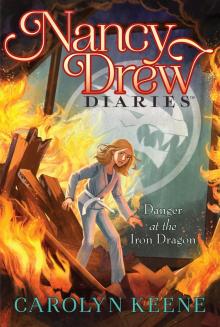 Danger at the Iron Dragon
Danger at the Iron Dragon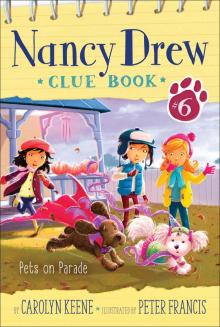 Pets on Parade
Pets on Parade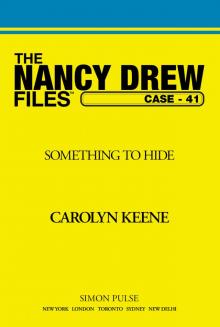 Something to Hide
Something to Hide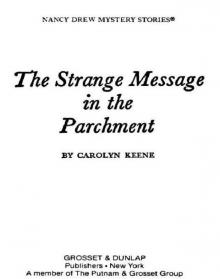 The Strange Message in the Parchment
The Strange Message in the Parchment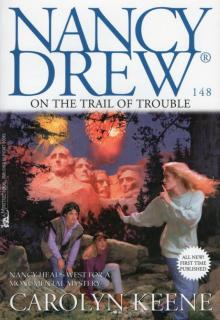 On the Trail of Trouble
On the Trail of Trouble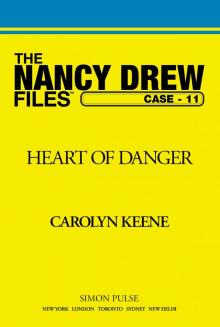 Heart of Danger
Heart of Danger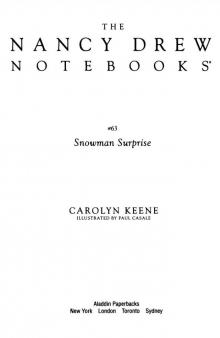 The Snowman Surprise
The Snowman Surprise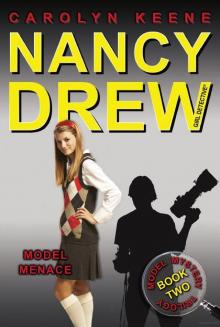 Model Menace
Model Menace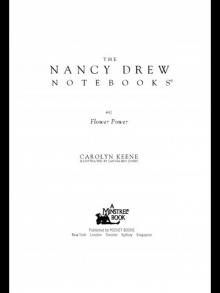 Flower Power
Flower Power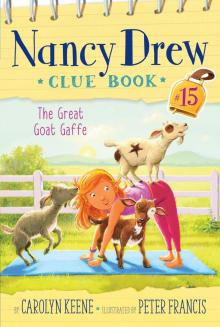 The Great Goat Gaffe
The Great Goat Gaffe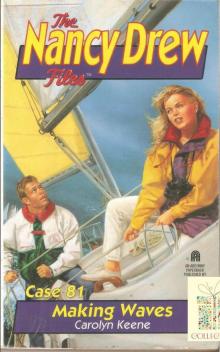 081 Making Waves
081 Making Waves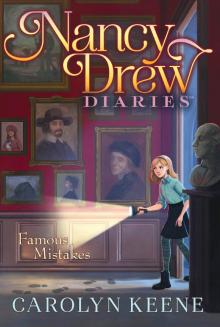 Famous Mistakes
Famous Mistakes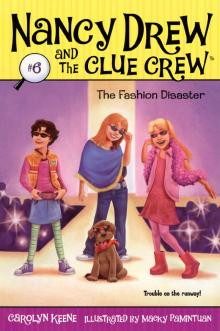 The Fashion Disaster
The Fashion Disaster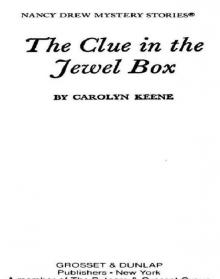 The Clue in the Jewel Box
The Clue in the Jewel Box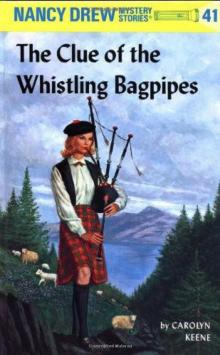 The Clue of the Whistling Bagpipes
The Clue of the Whistling Bagpipes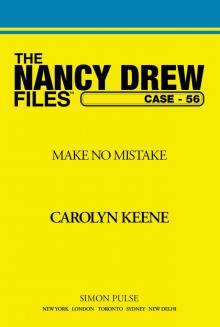 Make No Mistake
Make No Mistake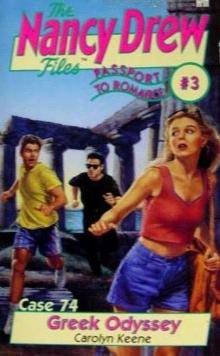 Greek Odyssey
Greek Odyssey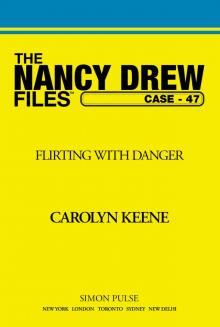 Flirting With Danger
Flirting With Danger Double Take
Double Take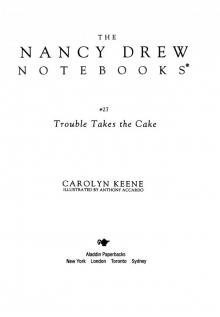 Trouble Takes the Cake
Trouble Takes the Cake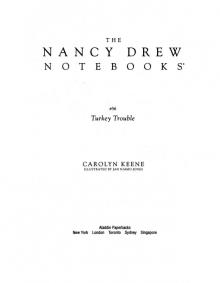 Turkey Trouble
Turkey Trouble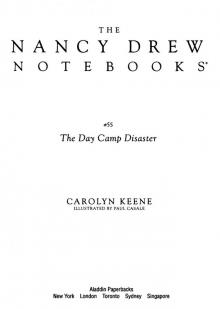 The Day Camp Disaster
The Day Camp Disaster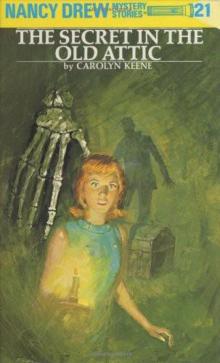 The Secret in the Old Attic
The Secret in the Old Attic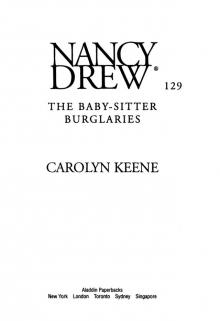 The Baby-Sitter Burglaries
The Baby-Sitter Burglaries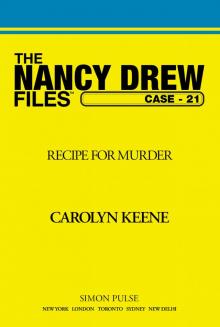 Recipe for Murder
Recipe for Murder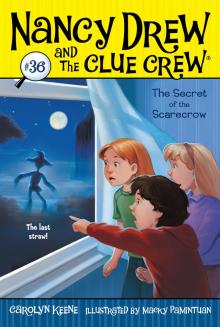 The Secret of the Scarecrow
The Secret of the Scarecrow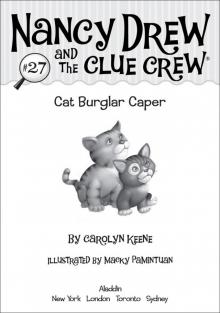 Cat Burglar Caper
Cat Burglar Caper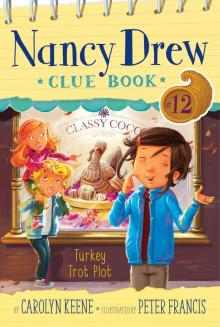 Turkey Trot Plot
Turkey Trot Plot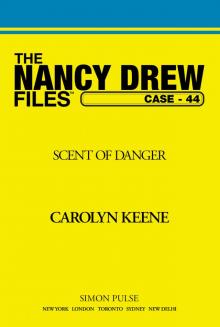 Scent of Danger
Scent of Danger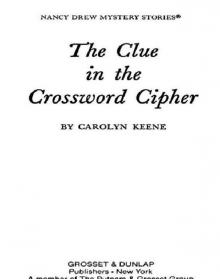 The Clue in the Crossword Cipher
The Clue in the Crossword Cipher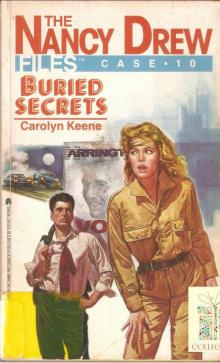 010 Buried Secrets
010 Buried Secrets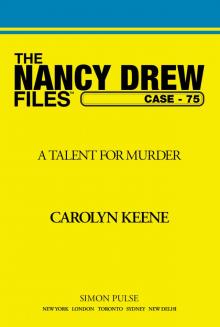 A Talent for Murder
A Talent for Murder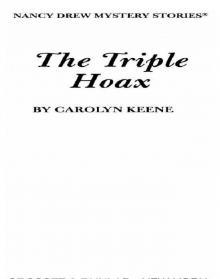 The Triple Hoax
The Triple Hoax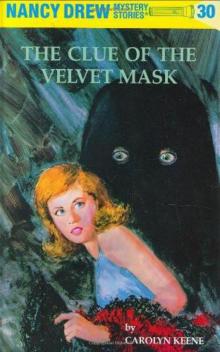 The Clue of the Velvet Mask
The Clue of the Velvet Mask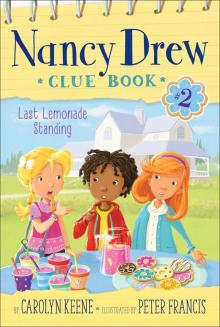 Last Lemonade Standing
Last Lemonade Standing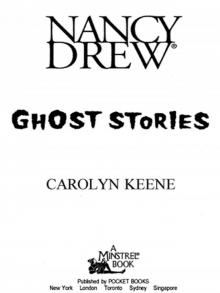 The Ghost of Blackwood Hall
The Ghost of Blackwood Hall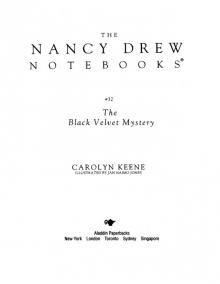 The Black Velvet Mystery
The Black Velvet Mystery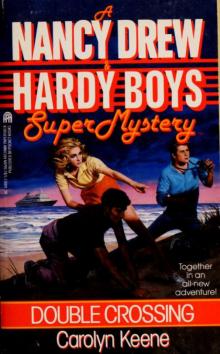 Double Crossing
Double Crossing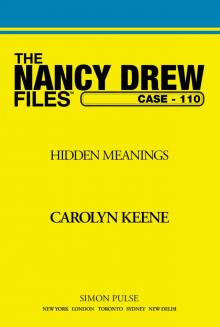 Hidden Meanings
Hidden Meanings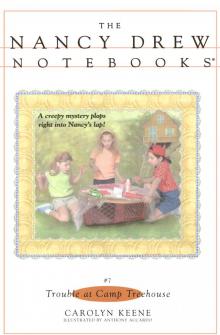 Trouble at Camp Treehouse
Trouble at Camp Treehouse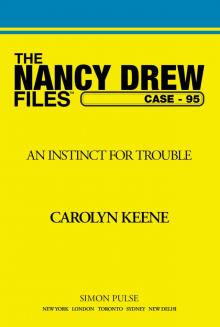 An Instinct for Trouble
An Instinct for Trouble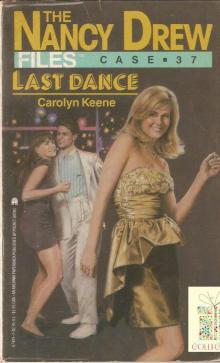 037 Last Dance
037 Last Dance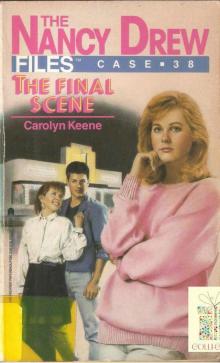 038 The Final Scene
038 The Final Scene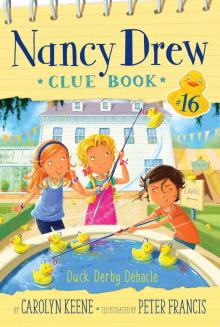 Duck Derby Debacle
Duck Derby Debacle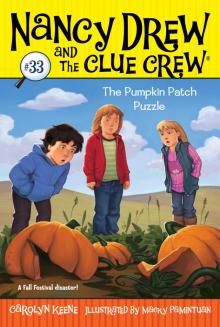 The Pumpkin Patch Puzzle
The Pumpkin Patch Puzzle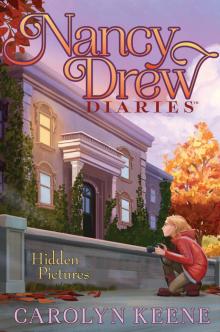 Hidden Pictures
Hidden Pictures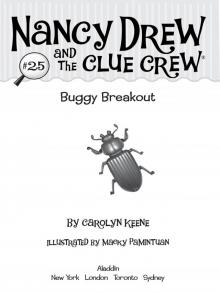 Buggy Breakout
Buggy Breakout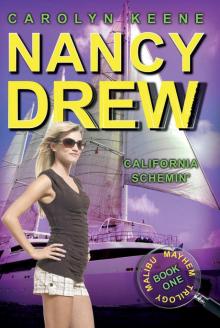 California Schemin'
California Schemin'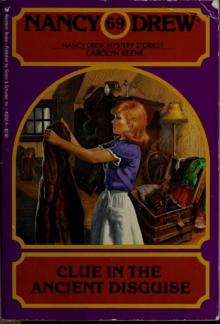 Clue in the Ancient Disguise
Clue in the Ancient Disguise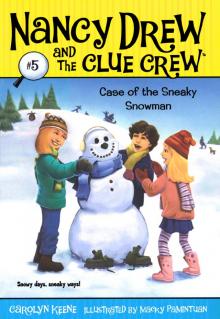 Case of the Sneaky Snowman
Case of the Sneaky Snowman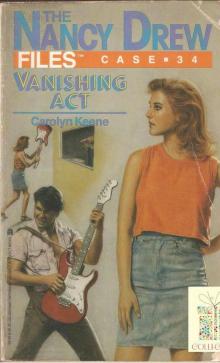 034 Vanishing Act
034 Vanishing Act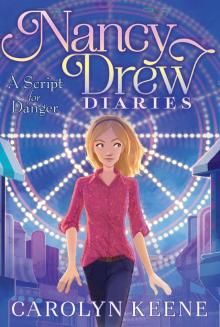 A Script for Danger
A Script for Danger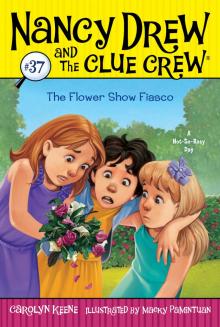 The Flower Show Fiasco
The Flower Show Fiasco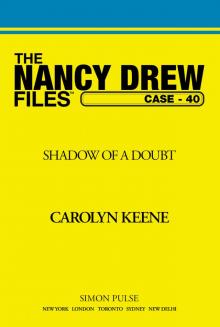 Shadow of a Doubt
Shadow of a Doubt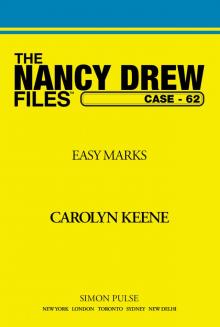 Easy Marks
Easy Marks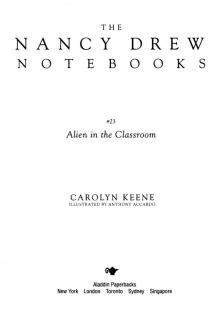 Alien in the Classroom
Alien in the Classroom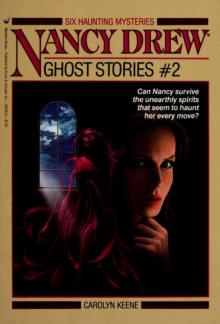 Ghost Stories, #2 (Nancy Drew)
Ghost Stories, #2 (Nancy Drew)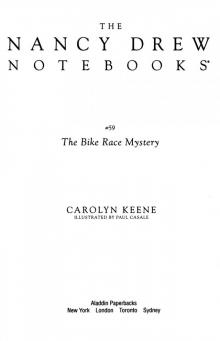 The Bike Race Mystery
The Bike Race Mystery False Pretenses
False Pretenses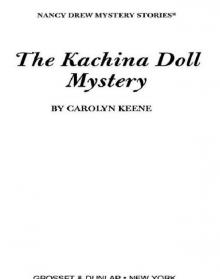 The Kachina Doll Mystery
The Kachina Doll Mystery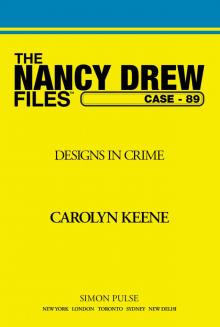 Designs in Crime
Designs in Crime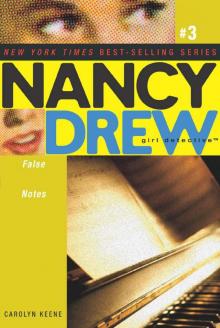 False Notes
False Notes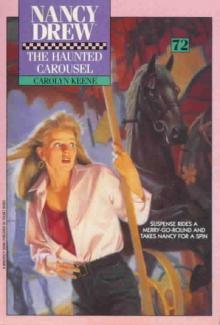 The Haunted Carousel
The Haunted Carousel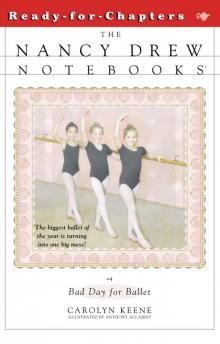 Bad Day for Ballet
Bad Day for Ballet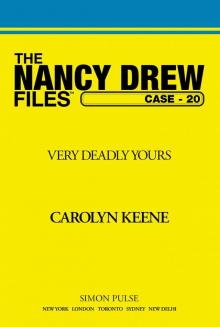 Very Deadly Yours
Very Deadly Yours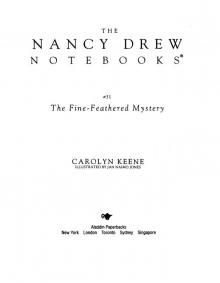 The Fine-Feathered Mystery
The Fine-Feathered Mystery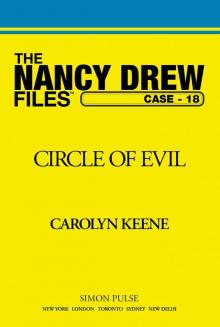 Circle of Evil
Circle of Evil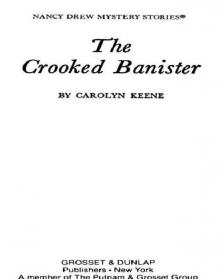 The Crooked Banister
The Crooked Banister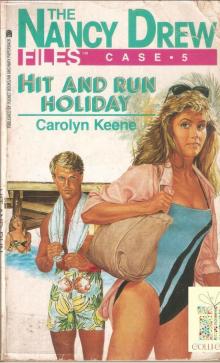 005 Hit and Run Holiday
005 Hit and Run Holiday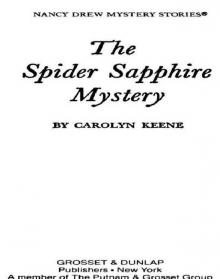 The Spider Sapphire Mystery
The Spider Sapphire Mystery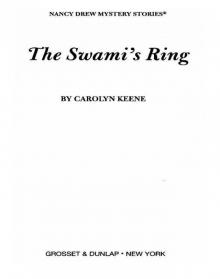 The Swami's Ring
The Swami's Ring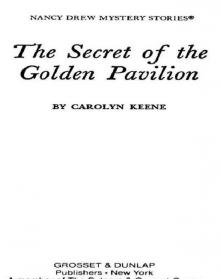 The Secret of the Golden Pavilion
The Secret of the Golden Pavilion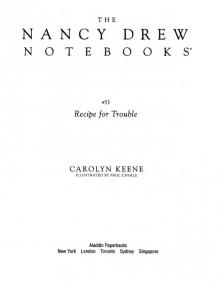 Recipe for Trouble
Recipe for Trouble Betrayed by Love
Betrayed by Love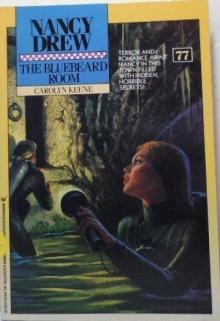 The Bluebeard Room
The Bluebeard Room Sweet Revenge
Sweet Revenge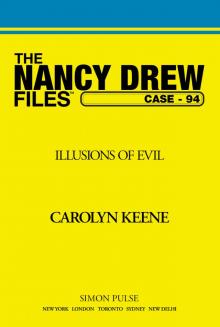 Illusions of Evil
Illusions of Evil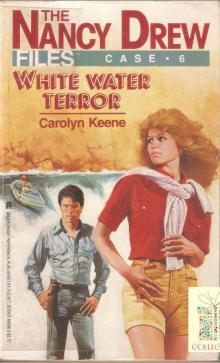 006 White Water Terror
006 White Water Terror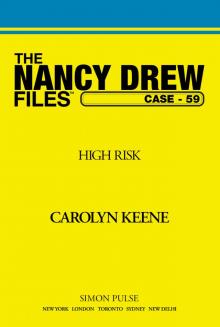 High Risk
High Risk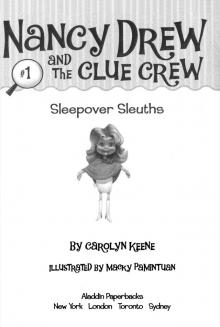 Sleepover Sleuths
Sleepover Sleuths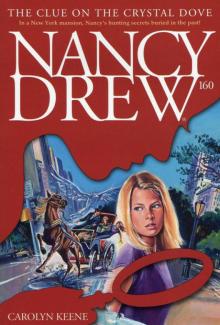 The Clue on the Crystal Dove
The Clue on the Crystal Dove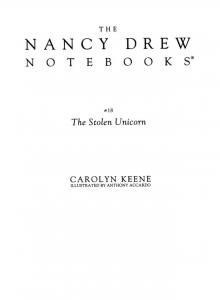 The Stolen Unicorn
The Stolen Unicorn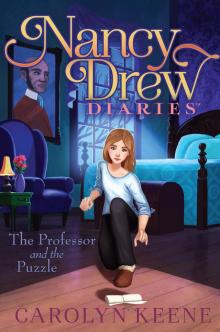 The Professor and the Puzzle
The Professor and the Puzzle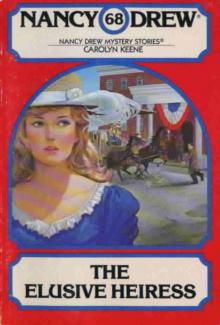 The Elusive Heiress
The Elusive Heiress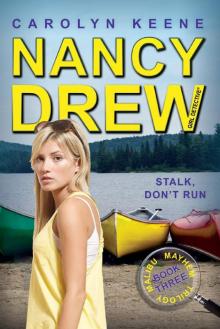 Stalk, Don't Run
Stalk, Don't Run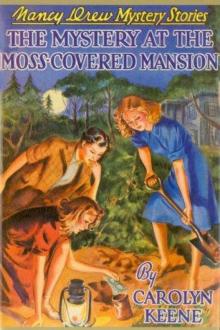 The Mystery at the Moss-Covered Mansion
The Mystery at the Moss-Covered Mansion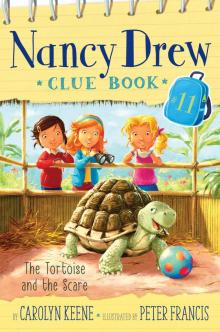 The Tortoise and the Scare
The Tortoise and the Scare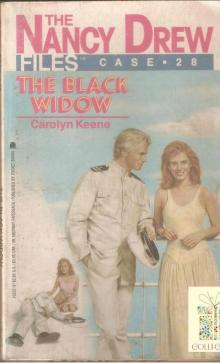 028 The Black Widow
028 The Black Widow Big Worry in Wonderland
Big Worry in Wonderland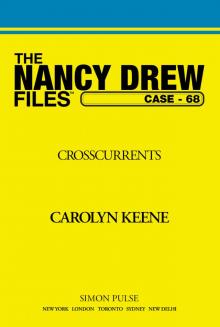 Crosscurrents
Crosscurrents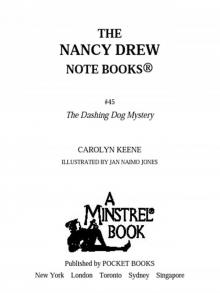 The Dashing Dog Mystery
The Dashing Dog Mystery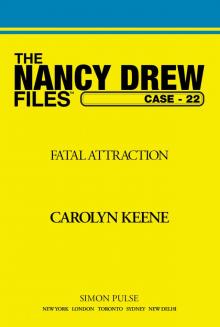 Fatal Attraction
Fatal Attraction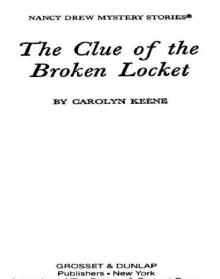 The Clue of the Broken Locket
The Clue of the Broken Locket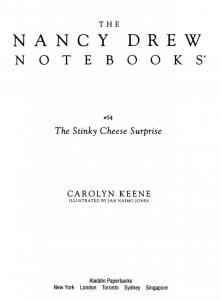 The Stinky Cheese Surprise
The Stinky Cheese Surprise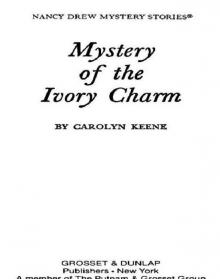 Mystery of the Ivory Charm
Mystery of the Ivory Charm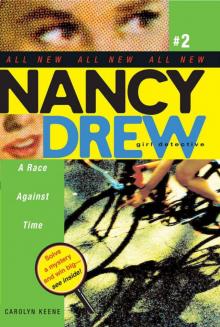 A Race Against Time
A Race Against Time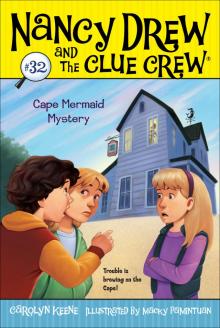 Cape Mermaid Mystery
Cape Mermaid Mystery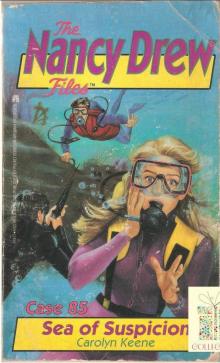 085 Sea of Suspicion
085 Sea of Suspicion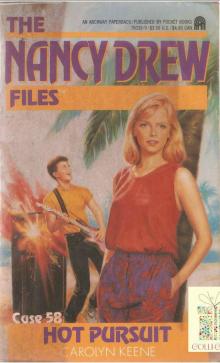 058 Hot Pursuit
058 Hot Pursuit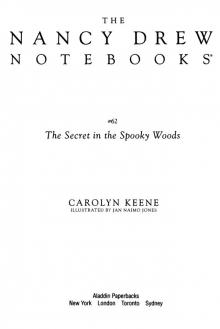 The Secret in the Spooky Woods
The Secret in the Spooky Woods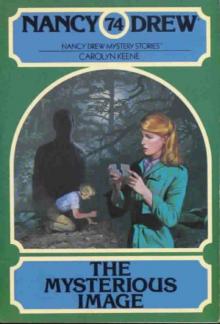 The Mysterious Image
The Mysterious Image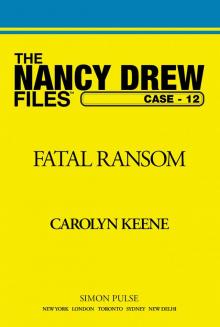 Fatal Ransom
Fatal Ransom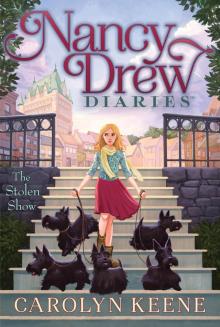 The Stolen Show
The Stolen Show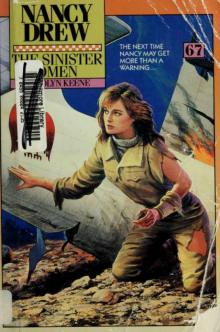 The Sinister Omen
The Sinister Omen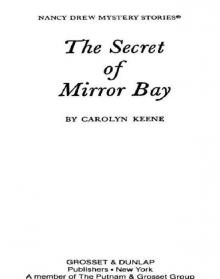 The Secret of Mirror Bay
The Secret of Mirror Bay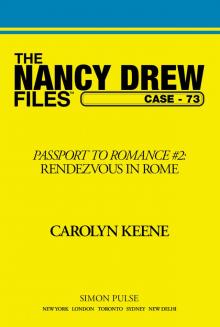 Rendezvous in Rome
Rendezvous in Rome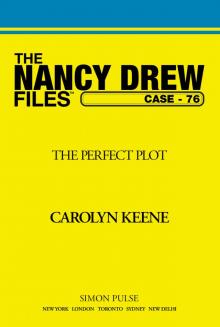 The Perfect Plot
The Perfect Plot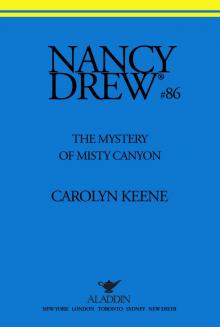 The Mystery of Misty Canyon
The Mystery of Misty Canyon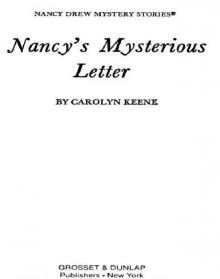 Nancy's Mysterious Letter
Nancy's Mysterious Letter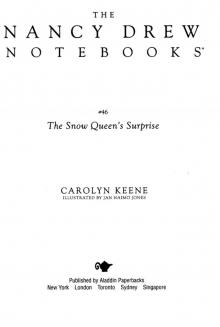 The Snow Queen's Surprise
The Snow Queen's Surprise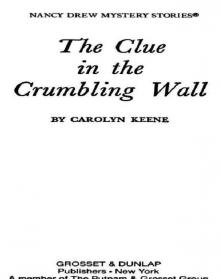 The Clue in the Crumbling Wall
The Clue in the Crumbling Wall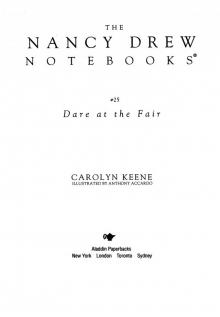 Dare at the Fair
Dare at the Fair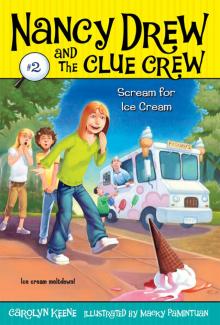 Scream for Ice Cream
Scream for Ice Cream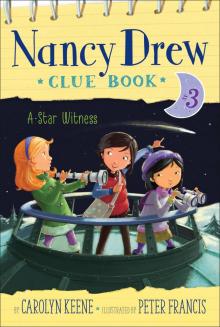 A Star Witness
A Star Witness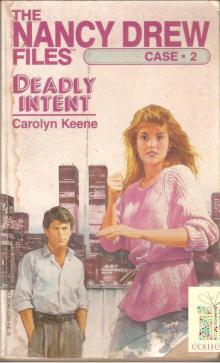 002 Deadly Intent
002 Deadly Intent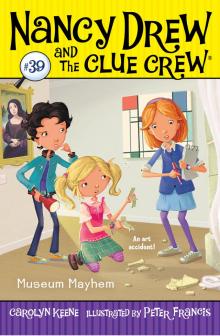 Museum Mayhem
Museum Mayhem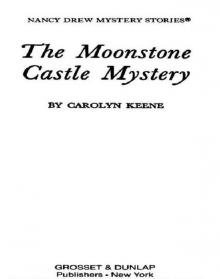 The Moonstone Castle Mystery
The Moonstone Castle Mystery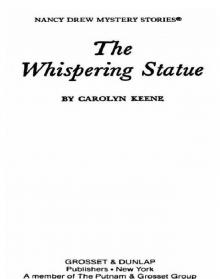 The Whispering Statue
The Whispering Statue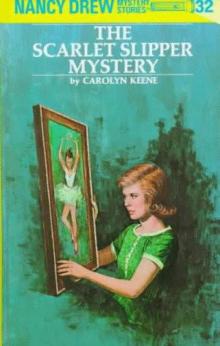 The Scarlet Slipper Mystery
The Scarlet Slipper Mystery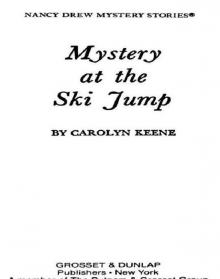 Mystery at the Ski Jump
Mystery at the Ski Jump Hot Pursuit
Hot Pursuit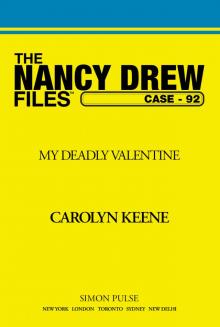 My Deadly Valentine
My Deadly Valentine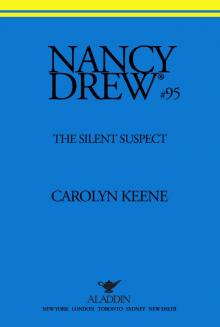 The Silent Suspect
The Silent Suspect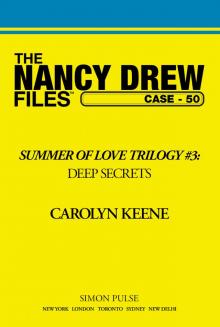 Deep Secrets
Deep Secrets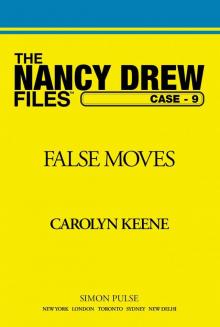 False Moves
False Moves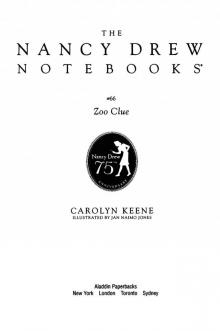 The Zoo Crew
The Zoo Crew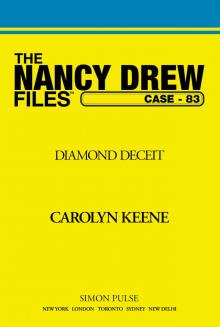 Diamond Deceit
Diamond Deceit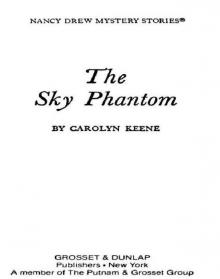 The Sky Phantom
The Sky Phantom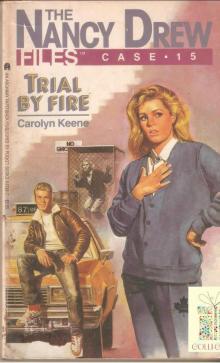 015 Trial by Fire
015 Trial by Fire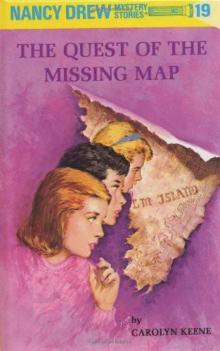 The Quest of the Missing Map
The Quest of the Missing Map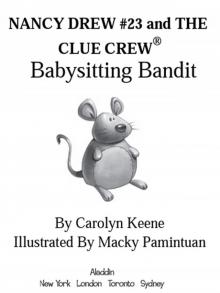 Babysitting Bandit
Babysitting Bandit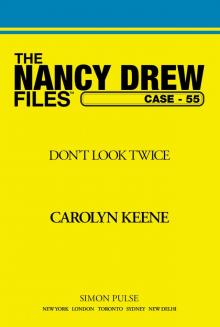 Don't Look Twice
Don't Look Twice Never Say Die
Never Say Die The Soccer Shoe Clue
The Soccer Shoe Clue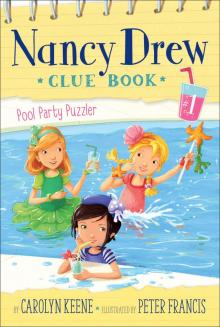 Pool Party Puzzler
Pool Party Puzzler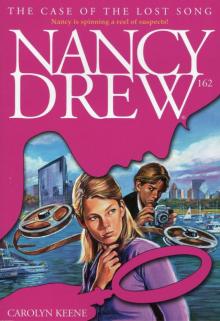 The Case of the Lost Song
The Case of the Lost Song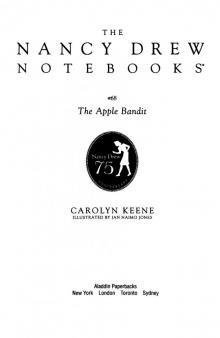 The Apple Bandit
The Apple Bandit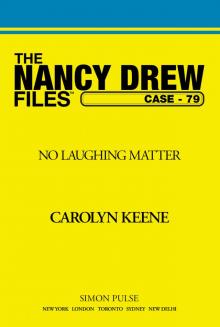 No Laughing Matter
No Laughing Matter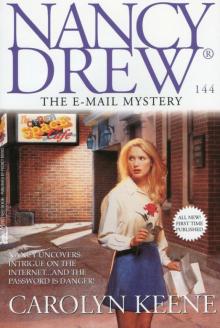 The Thirteenth Pearl
The Thirteenth Pearl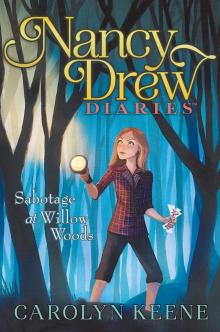 Sabotage at Willow Woods
Sabotage at Willow Woods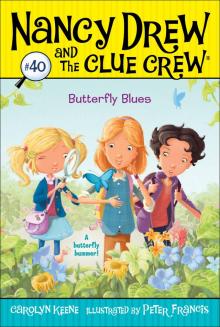 Butterfly Blues
Butterfly Blues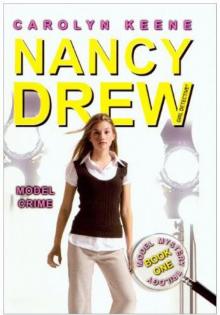 Model Crime 1
Model Crime 1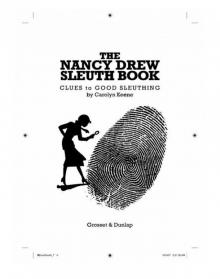 The Nancy Drew Sleuth Book
The Nancy Drew Sleuth Book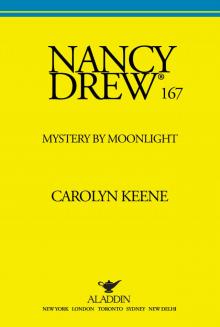 Mystery by Moonlight
Mystery by Moonlight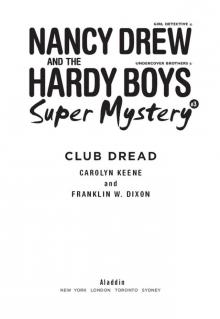 Club Dread
Club Dread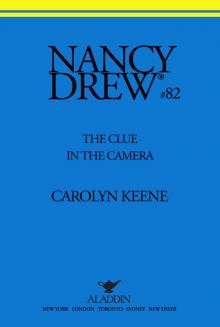 The Clue in the Camera
The Clue in the Camera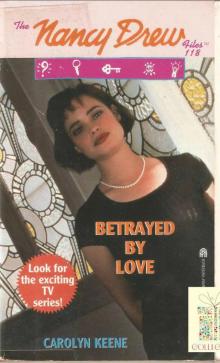 118 Betrayed By Love
118 Betrayed By Love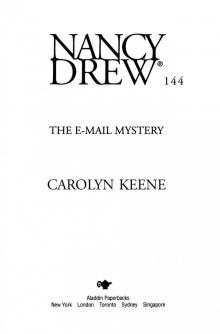 The E-Mail Mystery (Nancy Drew Book 144)
The E-Mail Mystery (Nancy Drew Book 144)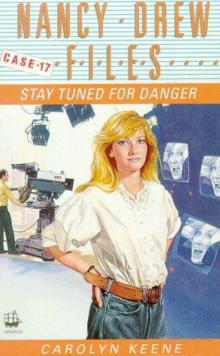 Stay Tuned for Danger: Circle of Evil
Stay Tuned for Danger: Circle of Evil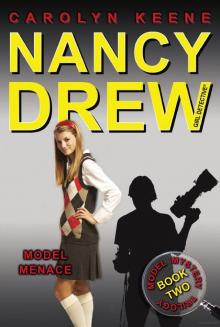 Model Menace 2
Model Menace 2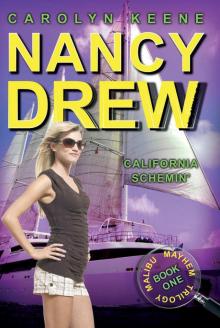 California Schemin': Book One in the Malibu Mayhem Trilogy
California Schemin': Book One in the Malibu Mayhem Trilogy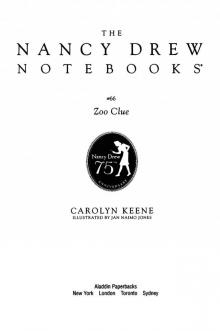 Zoo Clue (Nancy Drew Notebooks)
Zoo Clue (Nancy Drew Notebooks)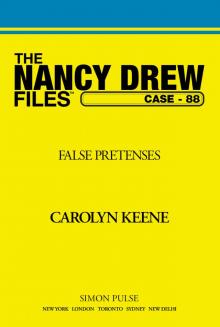 False Pretences
False Pretences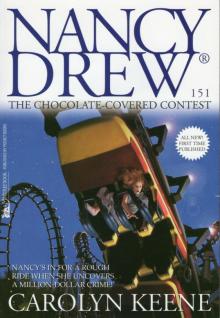 151 The Chocolate-Covered Contest
151 The Chocolate-Covered Contest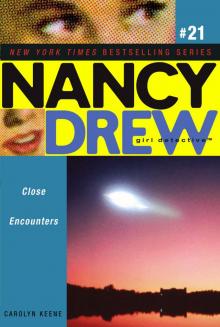 Close Encounters
Close Encounters The Emeral-Eyed Cat Mystery
The Emeral-Eyed Cat Mystery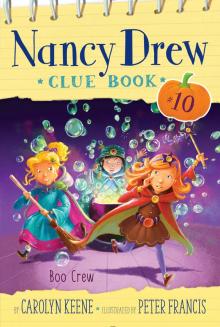 Boo Crew
Boo Crew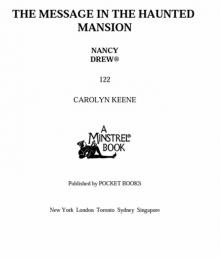 The Message in the Haunted Mansion (Nancy Drew Book 122)
The Message in the Haunted Mansion (Nancy Drew Book 122)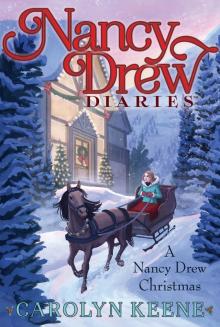 A Nancy Drew Christmas
A Nancy Drew Christmas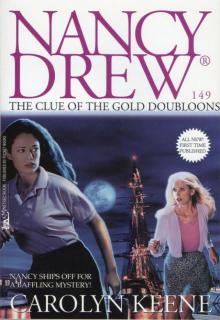 149 The Clue Of The Gold Doubloons
149 The Clue Of The Gold Doubloons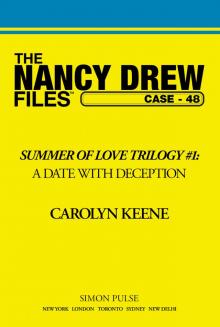 A Date with Deception
A Date with Deception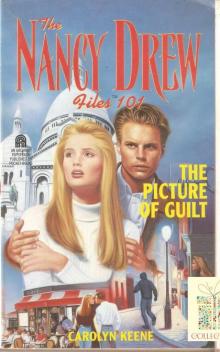 101 The Picture of Guilt
101 The Picture of Guilt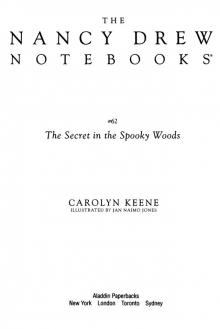 The Secret in the Spooky Woods (Nancy Drew Notebooks Book 62)
The Secret in the Spooky Woods (Nancy Drew Notebooks Book 62)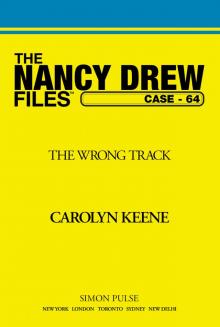 The Wrong Track
The Wrong Track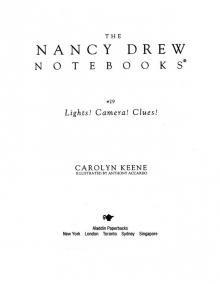 Lights! Camera! Clues!
Lights! Camera! Clues!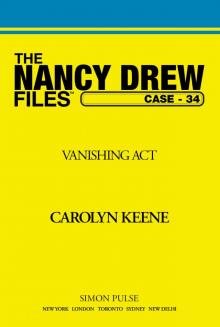 The Vanishing Act
The Vanishing Act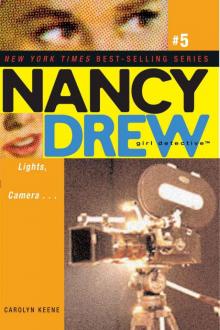 Lights, Camera . . .
Lights, Camera . . .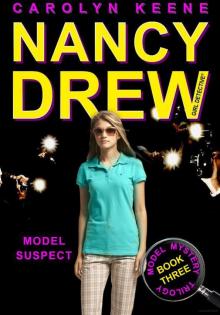 Model Suspect 3
Model Suspect 3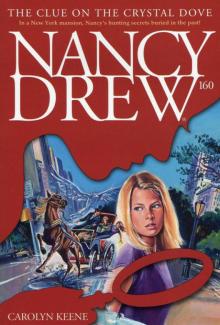 160 The Clue On The Crystal Dove
160 The Clue On The Crystal Dove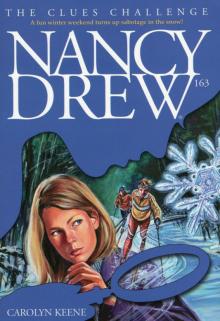 163 The Clues Challenge
163 The Clues Challenge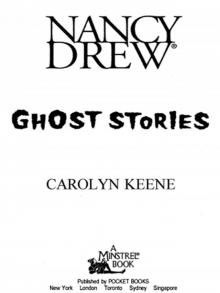 Ghost Stories (Nancy Drew)
Ghost Stories (Nancy Drew)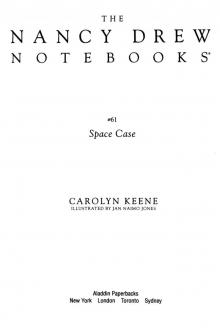 Space Case (Nancy Drew Notebooks Book 61)
Space Case (Nancy Drew Notebooks Book 61)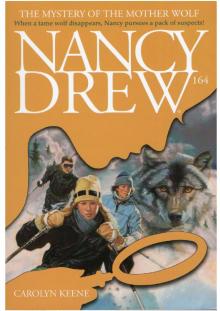 164 The Mystery Of The Mother Wolf
164 The Mystery Of The Mother Wolf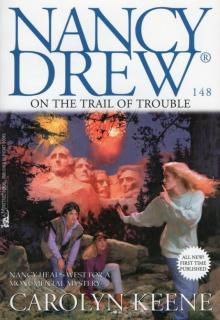 148 On The Trail Of Trouble
148 On The Trail Of Trouble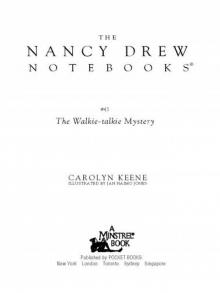 The Walkie-Talkie Mystery
The Walkie-Talkie Mystery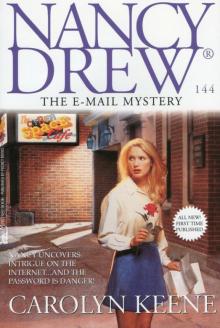 The E-Mail Mystery
The E-Mail Mystery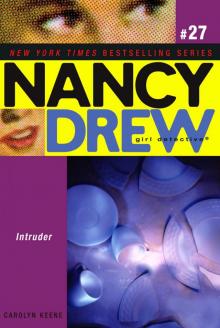 Intruder (Nancy Drew (All New) Girl Detective)
Intruder (Nancy Drew (All New) Girl Detective)![The Stolen Relic [Nancy Drew Girl Detective 007] Read online](http://i1.bookreadfree.com/i2/04/11/the_stolen_relic_nancy_drew_girl_detective_007_preview.jpg) The Stolen Relic [Nancy Drew Girl Detective 007]
The Stolen Relic [Nancy Drew Girl Detective 007]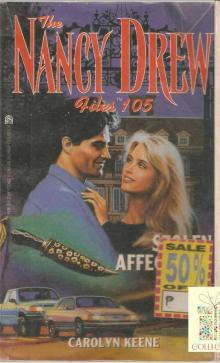 105 Stolen Affections
105 Stolen Affections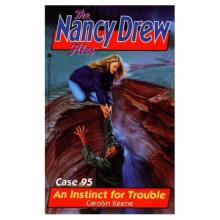 An Instict for Trouble
An Instict for Trouble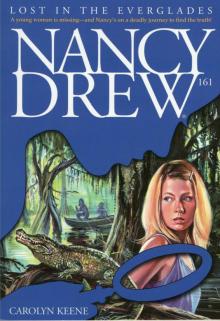 161 Lost In The Everglades
161 Lost In The Everglades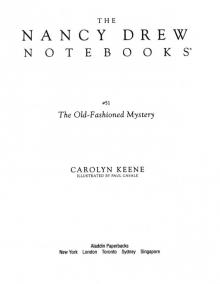 The Old-Fashioned Mystery
The Old-Fashioned Mystery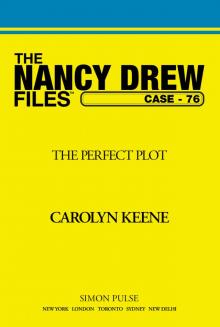 Perfect Plot
Perfect Plot